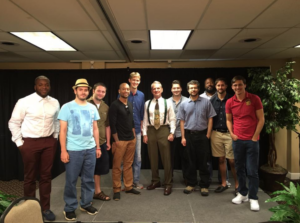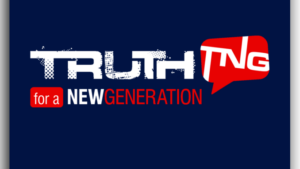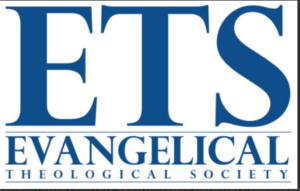Back in May of 2023, Nick Peters of Deeper Waters ministries asked me if I would attend Defend 2024; a Christian Apologetics conference held at New Orleans Baptist Theological Seminary. I said that I would, that it sounded like fun, so I began saving up.
On January 1st, I left my home in Piedmont South Carolina and headed for the Atlanta airport. The reason I didn’t go to the Greenville Airport is that Greenville airlines typically just fly you to Atlanta and make you switch flights anyway. I don’t know why they do that, but they do. Therefore, every time I’ve ever flown, I’ve had someone dive me down to the Airport in Atlanta Georgia. After all, it’s only about a 2 hour drive.
When I got to the airport, I hurriedly tried to find my gate and consistently prayed silently that I wouldn’t get lost. As Nick can attest, I have a terrible sense of direction. I made it to my gate, but I still had some time before my flight took off, so I went over to a gift shop to look around. To my surprise, there were several Christian books on a stand. Two of which I bought (see picture below). One of the books was a novel adaptation of the first few episodes of “The Chosen”. I thought this was odd since to read this would be to read a book based on a TV show that’s based on books (i.e the gospels). As much as I am a fan of The Chosen, I did not buy that book. Instead I bought “What The Bible Says About Managing Stress” and “What The Bible Says About Managing Emotions”. These aren’t heavy duty theology texts, but they looked like nice devotional I could take a couple of minutes to read every morning.
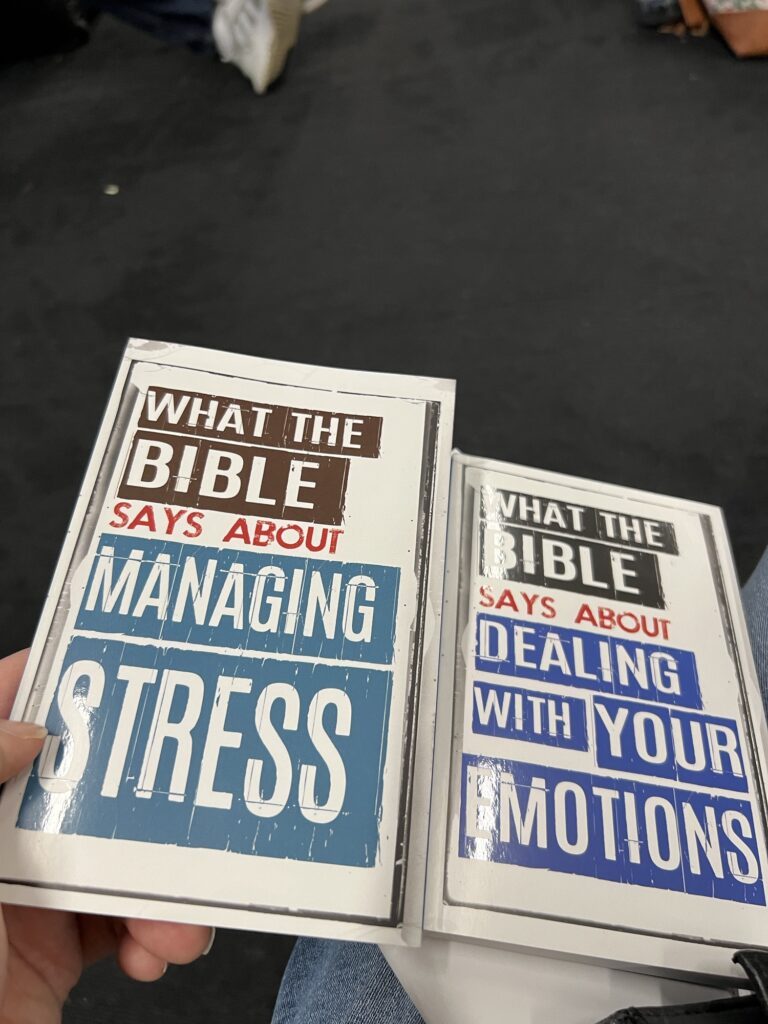
After purchasing these, I sat down by the gate and waited. I thought it was a little funny that I wasn’t even at the conference yet and I ALREADY bought two books.
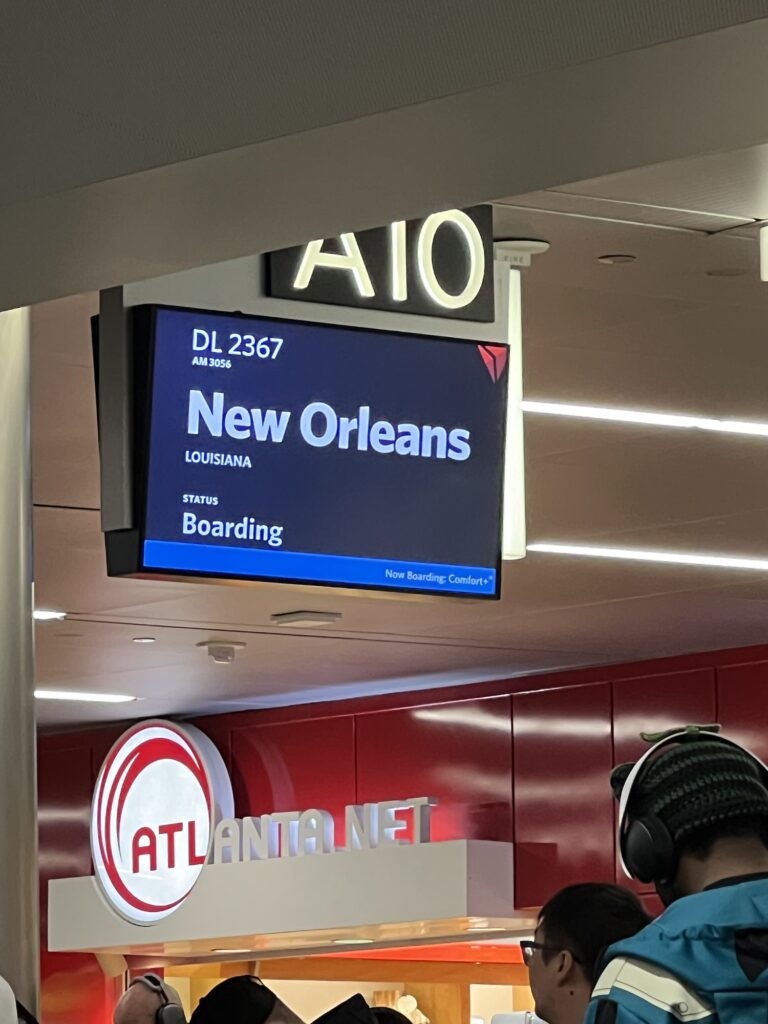
On the plane, I had a moment of awe and wonder come over me. I realized that even from just that height, everything below me was so small. All the big cities looked like Christmas lights from the plane window. Even if it were day time, I doubt people could have been seen at all. I could see the stars above and the city lights below. I was conscious of my smallness as I am when I consider the grand size of the universe in general. Atheists, for some bizarre reason, try to use the size of the universe against the truth of Christian theism. They argue that we’re so small in comparison to the enormous universe that we must be insignificant. God wouldn’t waste so much space creating a universe with billions of galaxies, trillions of stars, and trillions of planets if He was crafting the universe for the purpose of entering into a relationship with humankind. I have never thought this was a good argument. For one thing, it does nothing to refute either premise of The Kalam Cosmological Argument which argues that a spaceless, timeless, immaterial, powerful, uncreated personal being brought the universe into existence. The two premises “Whatever begins to exist has a cause” and “The Universe began to exist” would still both be true. It doesn’t refute The Cosmic Fine-Tuning Argument (because parameters like the strength of the Strong Nuclear Force and the strength of gravity affect the entire universe, not just part of it). It doesn’t refute The Moral Argument or The Ontological Argument. And it does nothing to refute the historical case for Jesus’ resurrection (be it from a Minimal Facts or Maximal Data Approach). Moreover, there are passages like Psalm 103:11 and Isaiah 40:25-26 which use the size of the universe as a unit of measurement for God’s love and greatness. As someone once said “The heavens declare the glory of God, not the glory of man.” (Cf. Psalm 19:1-4). “Universe big, therefore atheism” has always been one of the worst arguments that atheists could possibly give. At most, it could serve as a potential defeater of the Local Fine-Tuning Argument.
But I digress. I thought about how great God is to hold the whole world in His hands, to sovereignly orchestrate and oversee everything that occurred down below, and that in His omniscience and omnipresence, He could attend to each one of us. In my mind, I remembered Psalm 139:8 in which the Psalmist is talking about the Omnipresence of God. In verse 8 particularly, he says “If I ascend to the heights of heaven, you are there.” God was with me, even 30,000 miles up in the sky. He was with me in South Carolina, and he was with me in New Orleans.
“Where can I go from your Spirit? Where can I flee from your presence? If I go up to the heavens, you are there; if I make my bed in the depths, you are there. If I rise on the wings of the dawn, if I settle on the far side of the sea, even there your hand will guide me, your right hand will hold me fast.” – Psalm 139:7-10
I’m glad that The Holy Spirit helps me to come to moments of appreciating His greatness even in something as mundane as a plane ride. The psalmist could only imagine ascending to the heights of heaven, but with airplanes and rockets, it’s actually possible to do that! And God is with us no matter how high we go!
Jesus said “And lo, I am with you always even to the end of the age.” – Matthew 28:20
Once I got to the Louis Armstrong Airport in New Orleans, I got my luggage from the bag claim area, and then headed out where I met Nick Peters in his car. Nick drove us back to his apartment which is directly on campus. He had an interesting GPS. It spoke with a woman’s voice and expressed the thoughts of a cat. It would say things like “Turn left…towards treats hopefully”, and “Keep straight. I’m blinking…because I’m happy!” and “Turn right…and stay in the sun if you can.”
We made it to his apartment where I settled in, but not before taking the selfie below.
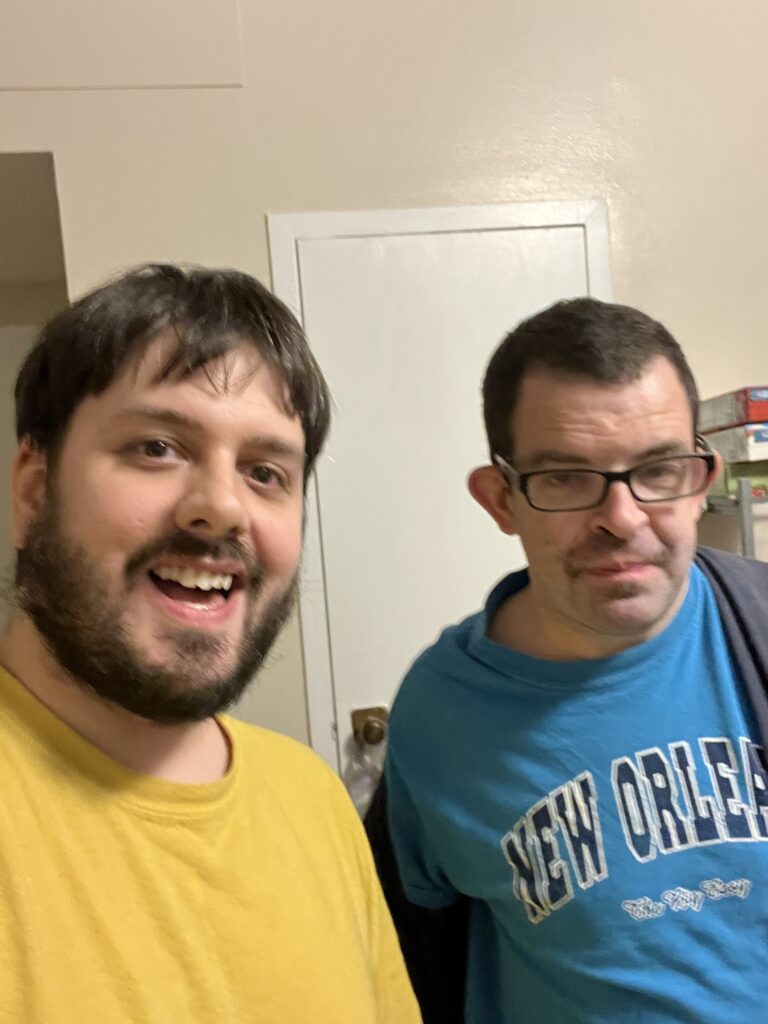
I arrived at around 8:30 or 9:00, so we had some time to kill before we went to. Nick introduced me to a show called “Mystery Science Theater 3000”. I’ll just leave that as an “unexplained allusion” because I want to move on with the story. It’s not a literary device filled with theological significance.
Nick’s apartment was a small three roomed apartment. I slept on his love seat. He’s not used to sleep overs, so I bought a blanket and pillow to sleep on. For the record, this was in between leaving the airport and arriving at the apartment. I’m narrating achronologically, not dischronologically for literary reasons. [1]Here, I’m taking jabs at New Testament scholars like Michael Licona and Craig Evans who make up wild literary theories out of their imaginations to account for, say, differences between the … Continue reading
DAY 1
In the morning, we went to the chapel and attended the first plenary talk. The talk was “The Most Important Thing In Christian Apologetics” given by Dr. Bob Stewart. Dr. Stewart serves as Professor of Philosophy and Greer-Heard Chair Of Faith at New Orleans Baptist Theological Seminary. In his talk, he talked about Christian Apologists having the right kind of heart.
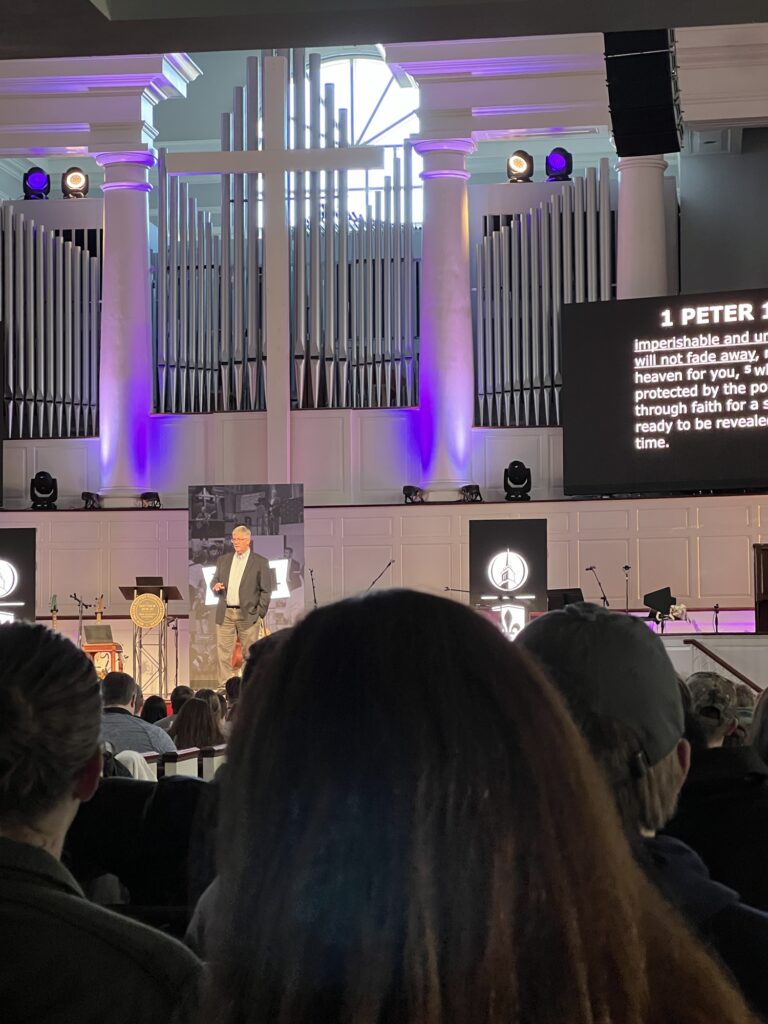
It was kind of a 3 Point Sermon (or, as Stewart called it “a lermon”, part lecture, part sermon). Point 3 of his talk was making sure we don’t love Christian Apologetics or the academic disciplines relevant to it more than we love Jesus. It is very possible to make study and research and the ministry work that comes out of it into an idol. It is entirely possible to love our service to God and his people more than the God we serve! I was reminded of one night in which it felt like God was asking me “If I called you away from apologetics ministry, would you still love me?” Now, I’m not like a crazy charismatic who claims to hear God speaking to them. Ok? I’m not in the “God told me” crowd. But this question came up in my mind out of the clear blue. I didn’t feel like my thought. It felt like a thought that was beamed into my brain. At first it unnerved me, because I thought “Is this The Holy Spirit’s conviction? Is Cerebral Faith my idol? Is that why You’re asking, God?” I thought about that all night. My answer? “Yes, Lord. I would still love you.” And then I quoted the words of Simon Peter “Lord, to whom would I go? You have the words of eternal life?” In context, Jesus had just given his Bread Of Life discourse. A good many of his followers turned his back on him because Jesus said they had to eat His flesh and drink His blood. Jesus turned to the twelve and asked “Will you also leave?” And Peter said “Lord, to whom will we go? You have the words of eternal life.” (See John 6:53-68). In retrospect, I feel like it was a call from God to examine myself. Even if God only wanted me to do apologetics ministry for a short time rather than my whole life, I’d be ok with that. What God wants is always best. “Not my will, but yours be done.” (Luke 22:42). Thankfully, I don’t think He is. I think it was just “Do you value Me over everything else?” And the answer is yes. I echo the words of The Apostle Paul; “But whatever were gains to me I now consider loss for the sake of Christ. What is more, I consider everything a loss because of the surpassing worth of knowing Christ Jesus my Lord, for whose sake I have lost all things. I consider them garbage, that I may gain Christ” (Philippians 3:7-8, NIV).
After the talk was over, Nick introduced me to some of the staff members in the Admission Center, who gave me a tour of the campus. The reason is that I am heavily considering attending this seminary to pursue my career in biblical scholarship. When the tour was over, it was time for the next plenary session.
This plenary session was given by David Calhoun who gave a talk surveying the different models people hold of how faith relates to science. He moved in the direction of strict literalist concordism all the way down to atheistic naturalism which says they can’t be harmonized and that what science says is true and what The Bible says is false.
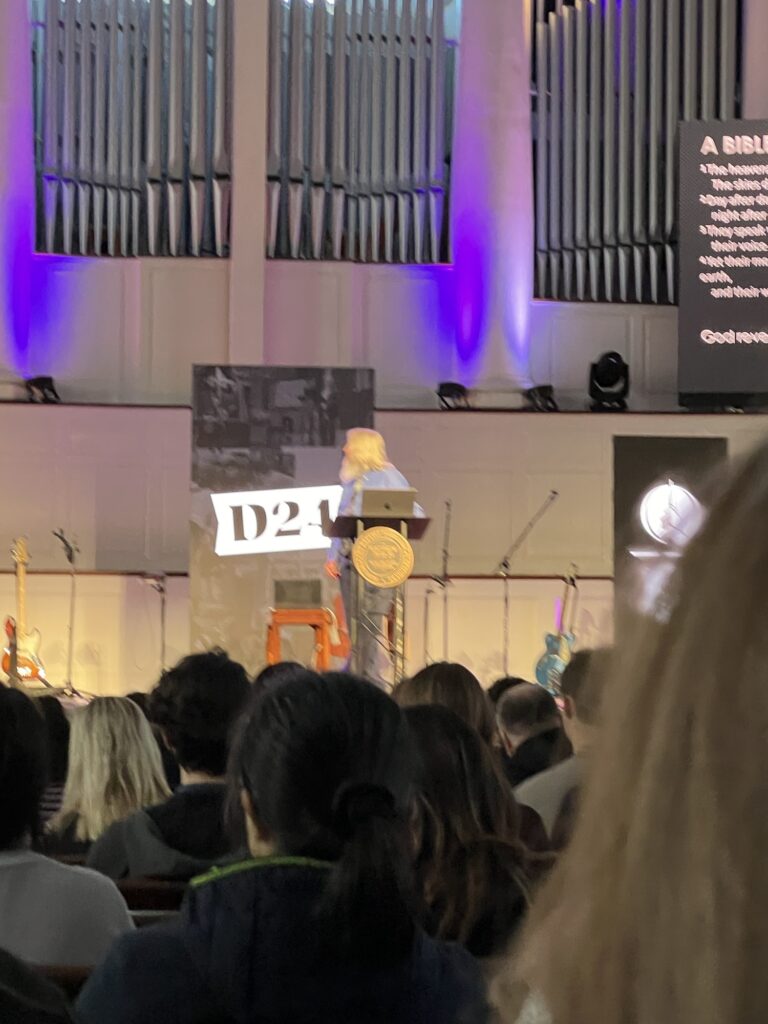
I myself found myself holding to the more Thomistic view which holds that The Bible is inspired and authoritative and that science is a reliable method of learning about nature. However, while the book of scripture and the book of nature are infallible and hold no lies, our ability to interpret is. [2]This is known as “The Two Books View” which is talked about in The Westminster Confession. The view holds that God is the ultimate author of scripture and is the Creator of the universe. Ergo, … Continue reading And that seems to be more or less where Calhoun himself landed. I don’t think The Bible intends to teach science. I think The Bible’s purpose is to provide accurate records of salvation history, to teach us theology (e.g the attributes of God, how to get saved, things about the afterlife), and morality (i.e how God wants us to live, like in The Ten Commandments and The Sermon On The Mount). My view could be mistaken for Stephen J. Gould’s Non-Overlapping Magesteria, but that’s not what I hold. I do think theology and science do, for the most part, stay in their own lanes, but there are undoubtedly points at which a conversation between them needs to be had.
For readers interested in knowing my own views on The Bible, science, etc. check out my essays “Genesis 1: Functional Creation, Temple Inauguration, and Anti-Pagan Polemics” and “Genesis 2-3: Adam and Eve as Archetypes, Priests In The Garden Of Eden, and The Fall”. You can also check out my two part podcast episode “Episode 168: What Evan Minton Thinks About The Bible – Part 1” and “Episode 169: What Evan Minton Thinks About The Bible – Part 2” on The Cerebral Faith Podcast. In the podcast episodes, I talk about how The Bible contains “dome cosmology” which was common in the Ancient Near East. God accommodated His theological message to the cosmological views the Israelites held. Nevertheless, I think, for example, science can provide evidence in premises in philosophical arguments for God’s existence (e.g The Kalam Cosmological Argument and The Fine-Tuning Argument).
At some point, I took a picture with Eric Hernandez who I’ve been Facebook friends with for a long time, and was also a speaker at the conference. He wrote a book called “The Lazy Approach To Evangelism: A Simple Guide For Conversing With Unbelievers” which I look forward to reading. Again, if future historians find that this took place before Calhoun’s talk, let it be said that I am narrating a chronologically. There is neither historical error nor a special literary device at play.
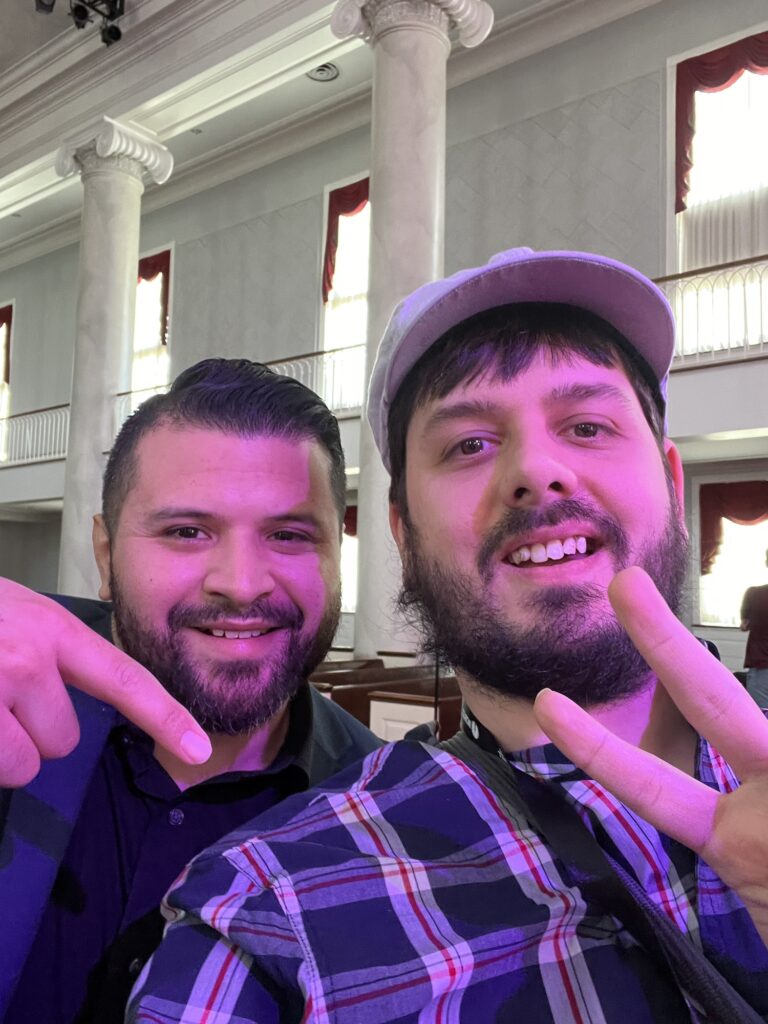
Also, here is a selfie of me sitting in one of the chapel pews.
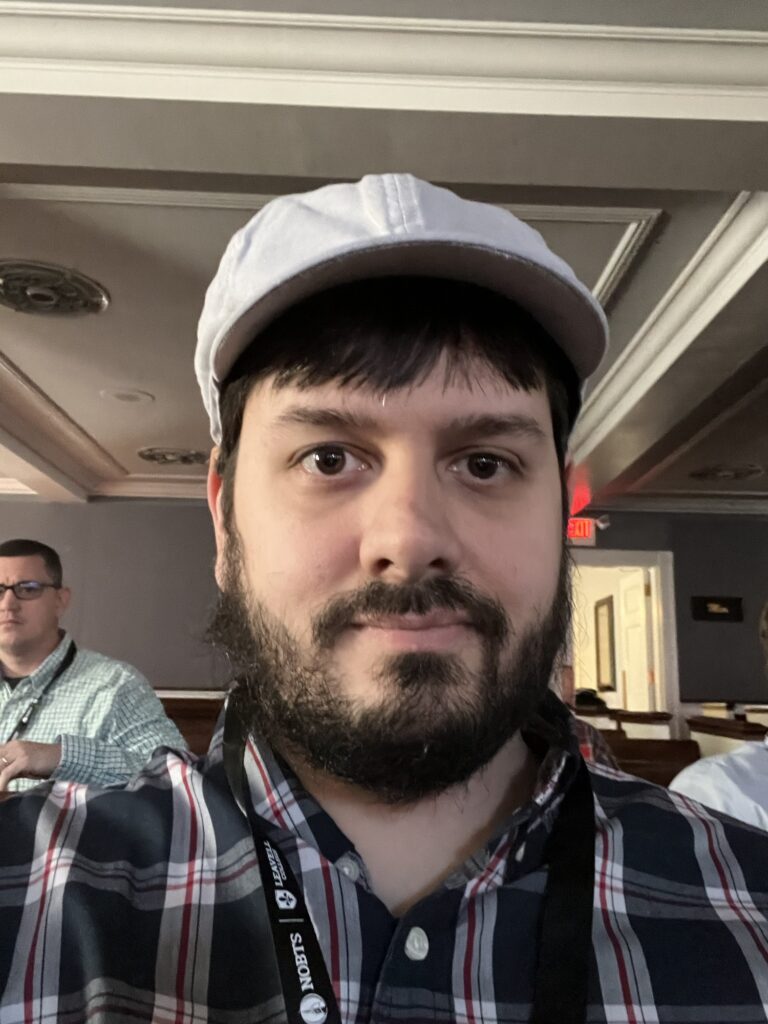
After attending two plenary sessions, it was time for the breakout sessions. The first breakout session I attended was by Old Testament Professor Corey Barnes. His talk was titled “What Should Apologists Know about The Nature and Setting of The Old Testament?”
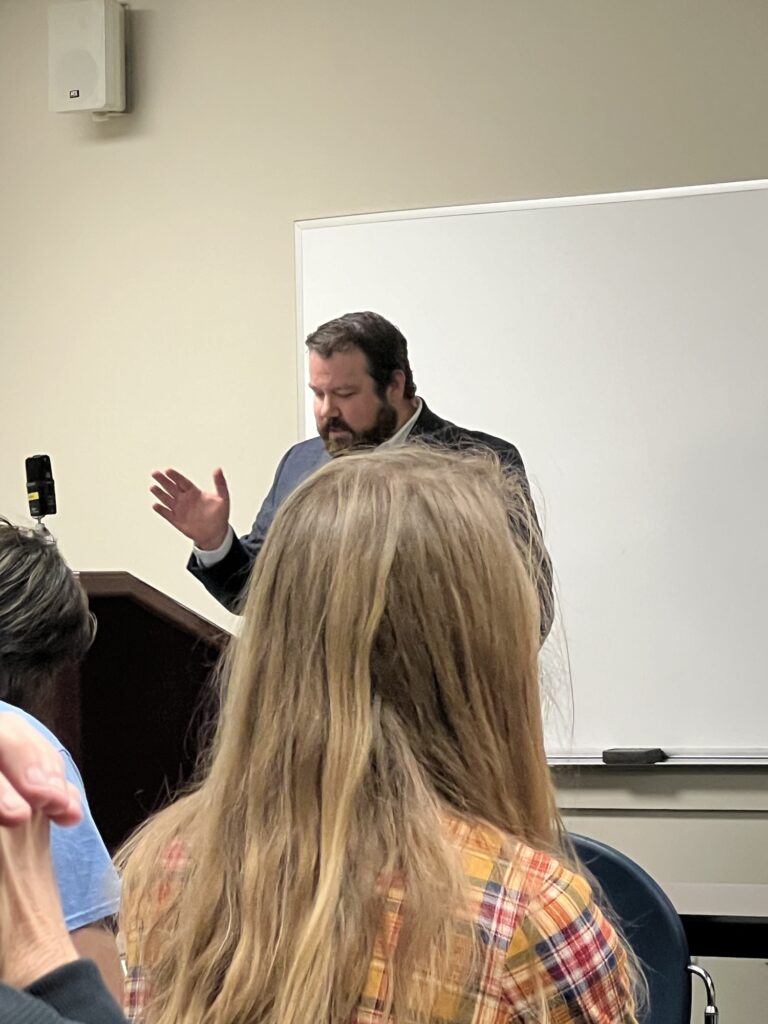
After that (Now I am narrating chronologically), I attended Nick Peter’s talk “Playing To Win: Reaching The Video Game Generation”.
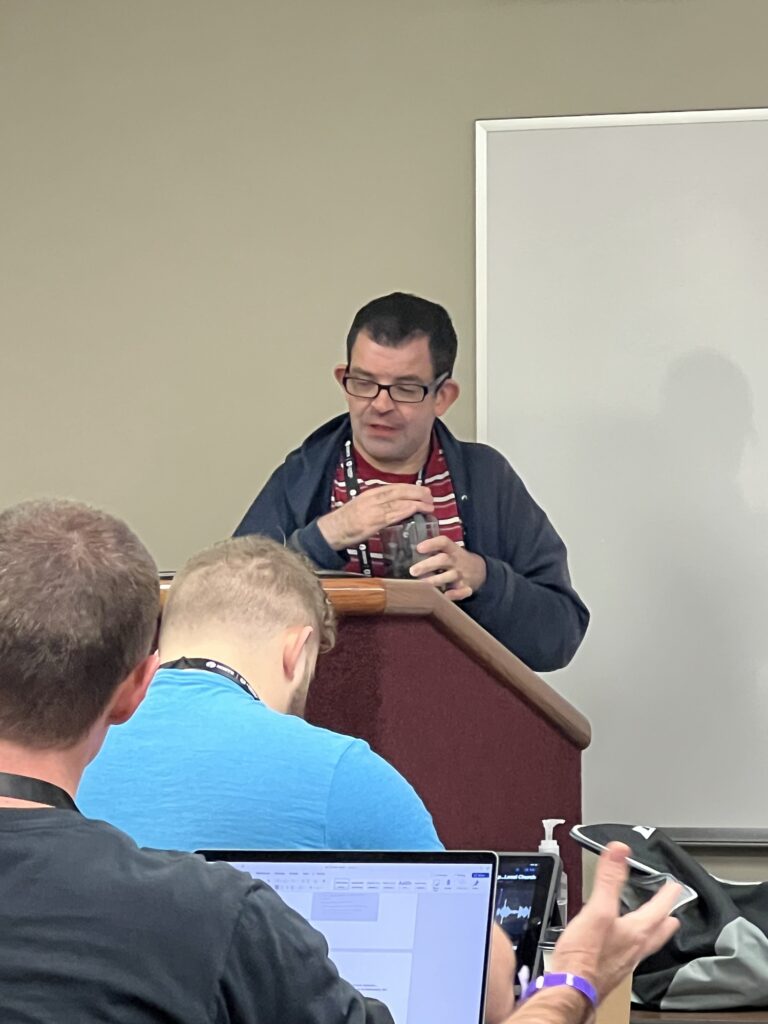
After that, I attended a talk from a Christian Apologist you might know quite well. Can you guess? I’ll give you a second. *Jeopardy Theme plays*. The answer is; Evan Minton! I like to refer to terms such as me, myself, or I. I gave a talk called “Making The Maximal Data Argument For Jesus’ Resurrection Attractive”. Basically, the point of my talk was to answer what I call “The Efficiency Objection” from those who prefer to use The Minimal Facts Approach. Many advocates of The Minimal Facts Argument think that a Maximal Data Argument is too inefficient; it takes too long to unpack, that there’s no way you can make your case in 15 minutes or less. The Maximal Data Argument argues for the historical factuality of Jesus’ resurrection from the supposition that the gospels are reliable. But proving they’re reliable involves making a huge cumulative case, right? You pretty much have to write a book every time you want to make your case, right? Wrong. In my talk, I show how one can use a gospel reliability approach without having to basically reproduce the entirety of “The Case For Christ” every single time.
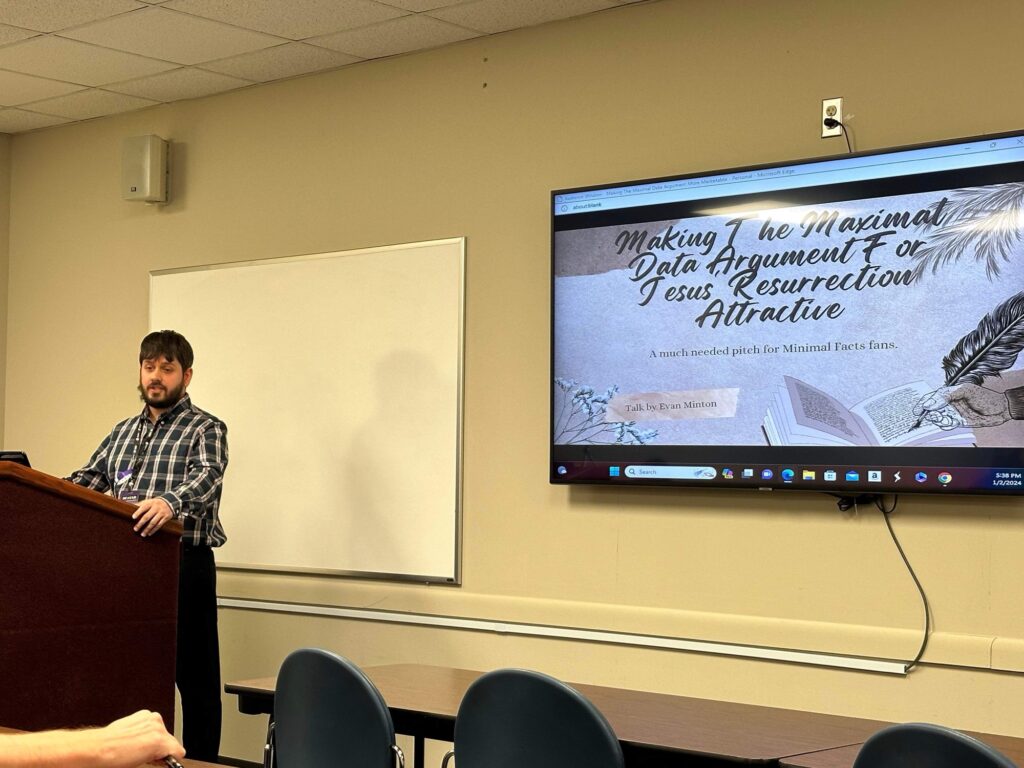
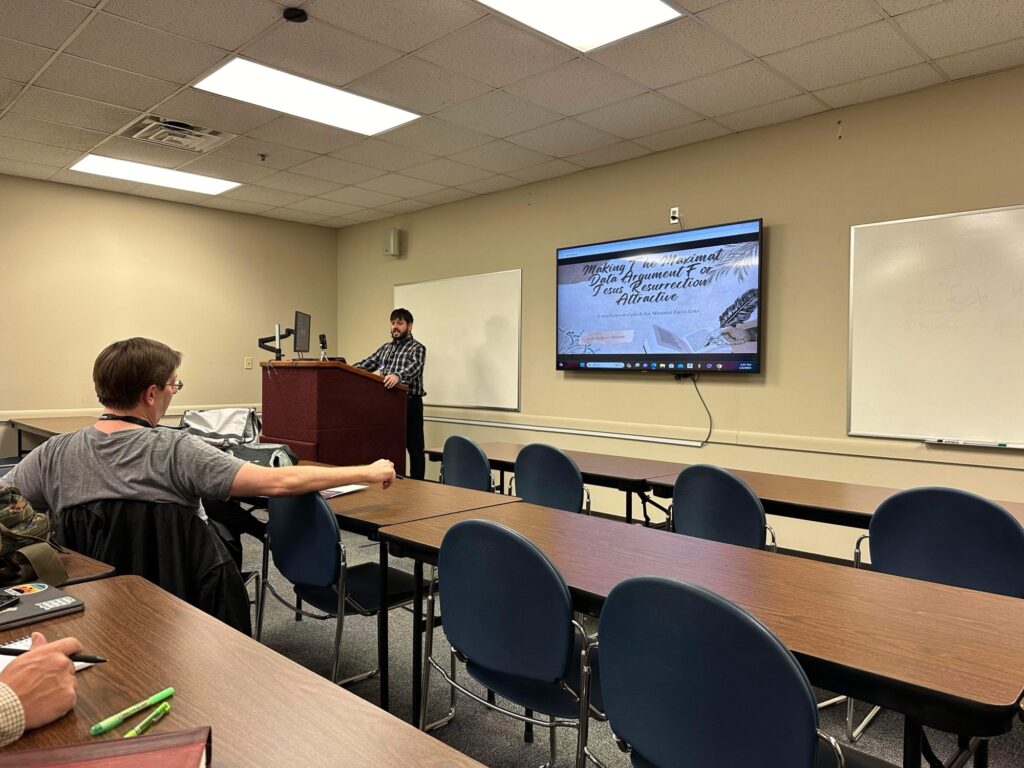
One thing I said in my talk is that I like both arguments. I like The Minimal Facts argument as well as The Maximal Data Argument. And I was just a bit frustrated with maximalists like The McGrews, Erik Manning, David Pallmann, and others, for not adequately responding to this objection. I came to the realization that it is not too inefficient on my own, as I was sitting on my back porch last September, going over all that I studied over the past 8 months. I basically came to an epiphany after piecing together things that apologists like Lydia McGrew and Erik Manning had said elsewhere. It should not be the case that I had to put the pieces together on my own. The efficiency objection should be adequately answered whenever it was raised. But I also made the point that I’m just as frustrated with folks like Gary Habermas and Michael Licona for not dealing with the specific objections the McGrews make to the soundness of The Minimal Facts Argument. If you’ve followed this blog for a while, you know that I took it upon myself to respond to McGrew.
At the end of my talk, I offered some resources for those wanting to learn the specific arguments for the reliability of the gospels. There were some free resources and paid resources. Of the free resources was my 11 part blog post series “The Case For The Reliability Of The Gospels”, which as I said in my talk, “I know it says ‘blog posts’ but these are pretty in depth. I accidentally wrote a book and put it up on my website”.
This was my first conference talk ever. I was a bit nervous beforehand. To calm my nerves, what I told myself repeatedly was that I had a long running podcast, that hundreds of people listened in every week, and that some of those were even streamed on my YouTube channel in front of a live audience of 20-30 people. I told myself that this is no different than when I gave live streamed presentations on YouTube, and that the only difference was that I could actually see my audience this time. When I began, the nerves went away and I presented as though it were just another podcast episode.
Also, Dr. Tim McGrew was in the audience. You’d think that make nerve issues worse, but it didn’t. I think he really liked my talk (I was advocating for more apologists to use the MDA after all).
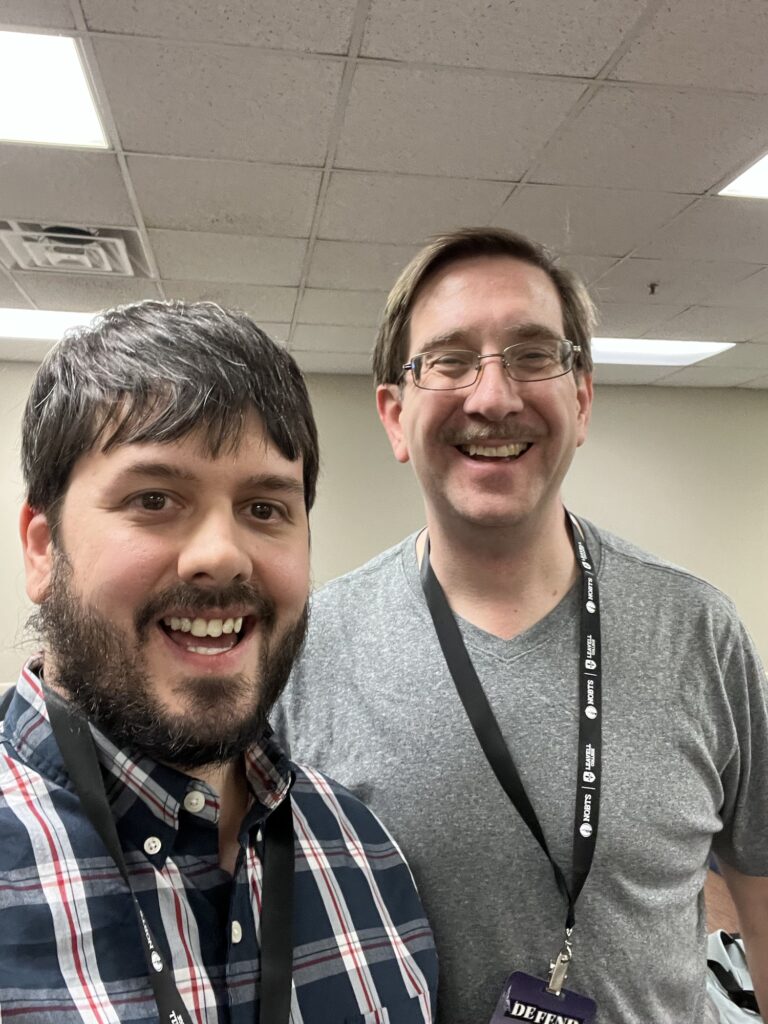
Tim McGrew is a great guy. He’s nice and friendly, his passion for the historical case for the gospels is evident in his talks, and while he has a professor’s mind, he has a pastor’s heart. One of the nice things he did for me was pull some strings for me and get me a Meal Ticket, so I could eat in the cafeteria. I initially decided not to get a meal ticket in order to save money, but I changed my mind at the last second. Speaking of meals, it was right after my talk that we went to the cafeteria for dinner.
Day 2
The second day of the conference began. I was a little late getting my day started, so when I made it to the Chapel, I had missed about 20 minutes or so of Dr. Michael Strauss’ talk “Addressing Naturalistic Alternatives To The Evidence For God From Science”. In this talk, Dr. Strauss, a physicist who conducts research at the CERN super collider in Switzerland, talked about how The Big Bang and cosmic fine-tuning point to a Creator, and why he thinks the alternatives that atheists come up with to get around the evidence aren’t successful. In my personal opinion, he was a bit more modest in his conclusions than I would be when talking about these same subjects, but I think it’s always better to understate your case than to overstate it. It’s always better to set the bar low and surpass it than to set it high and not (in the eyes of your audience or interlocutor) fail to meet it.
After that, I attended Troy Gause-LaFrance’s talk “B.R.I.C (Black Religious Identity Cults”.
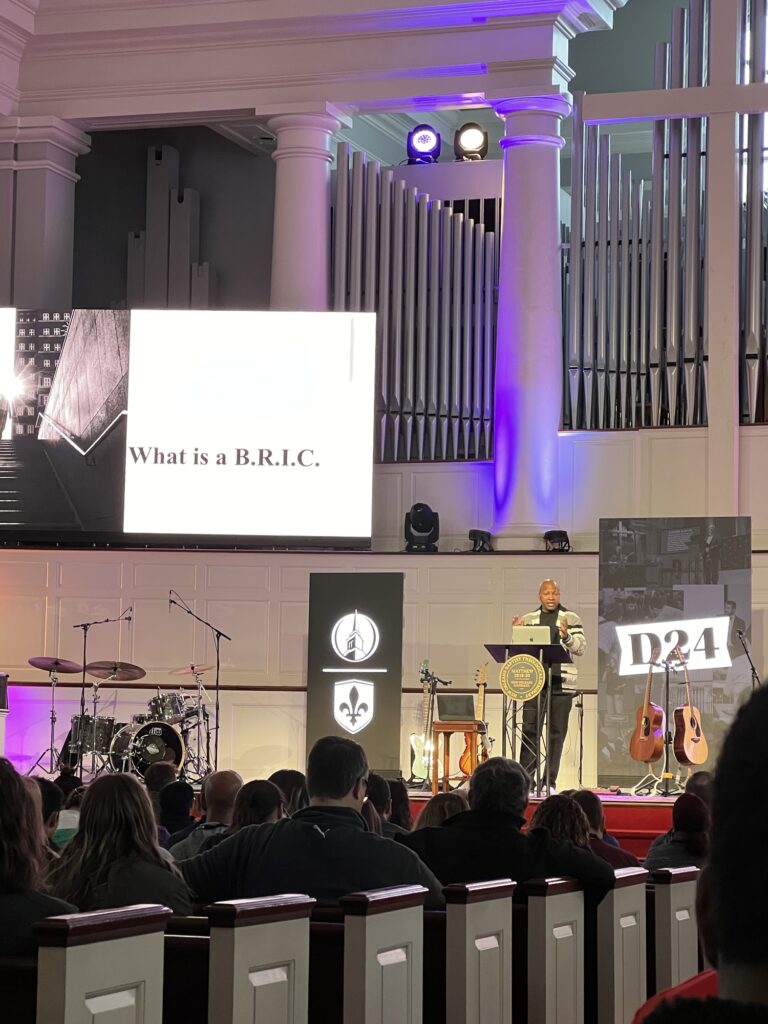
After that, I had lunch. Once lunch was over, it was time to attend another plenary session. This one was by Robert M. Bowman titled “The Trouble With The Trinity”. In this talk, Bowman made a case for the doctrine of The Trinity from The Bible as well as for the doctrine of the incarnation. And he talked about how non-Christian cults see Jesus as opposed to orthodox Christians.
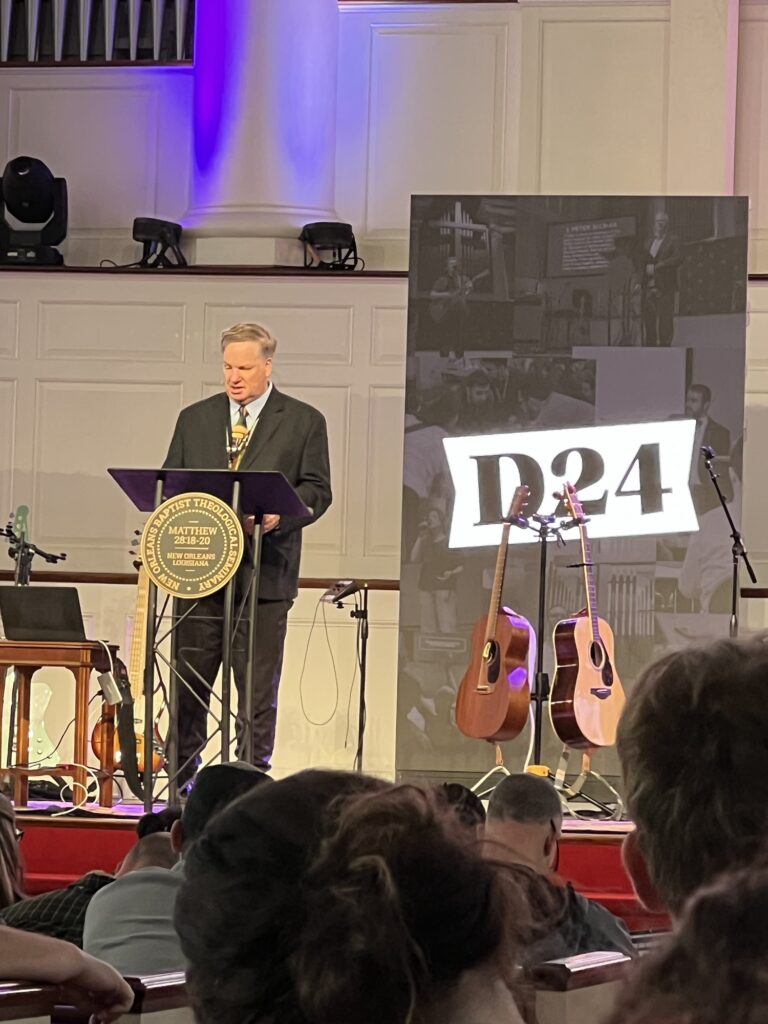
Robert M Bowman is a great apologist for the deity of Jesus. I absolutely loved his book “Putting Jesus In His Place: The Case For The Deity Of Christ”. It is one of the best biblical defenses for Jesus Christ being God that I have read so far. I bought one of his other books at this conference, which you’ll see a picture of later in this article. And, by the way, as soon as these talks are available to purchase, I will post a link on The Cerebral Faith Facebook page.
After Robert Bowman’s talk, I went on to the first breakout session of the day. The talk I attended was Nick Peter’s talk “Christianity and Autism”. I was diagnosed as being on the autism spectrum in 2022, so I really appreciated this talk. Nick and I are both autistic, and in his talk, he went over a lot of the symptoms that autistic people have. Now, not all autistics are created equal. That should be obvious from the fact that some of us (like Nick and myself) are verbal, while others are non-verbal. The so-called “low functioning” autistics freak out if you touch them, but I have no problem with hugs and hand shakes. Nick described some of the traits he has that are due to autism. I resonated with many of them and did not with others. For example, while a bit shy, I’m good at socializing. Though maybe I’m just extremely good at “masking”. Nick’s autism makes him finicky, whereas I will eat just about anything you put in front of me. One thing I learned about autism that surprised me was that a large number of high functioning autistics are atheists. Nick said this could be due to some autistics having trouble thinking abstractly.
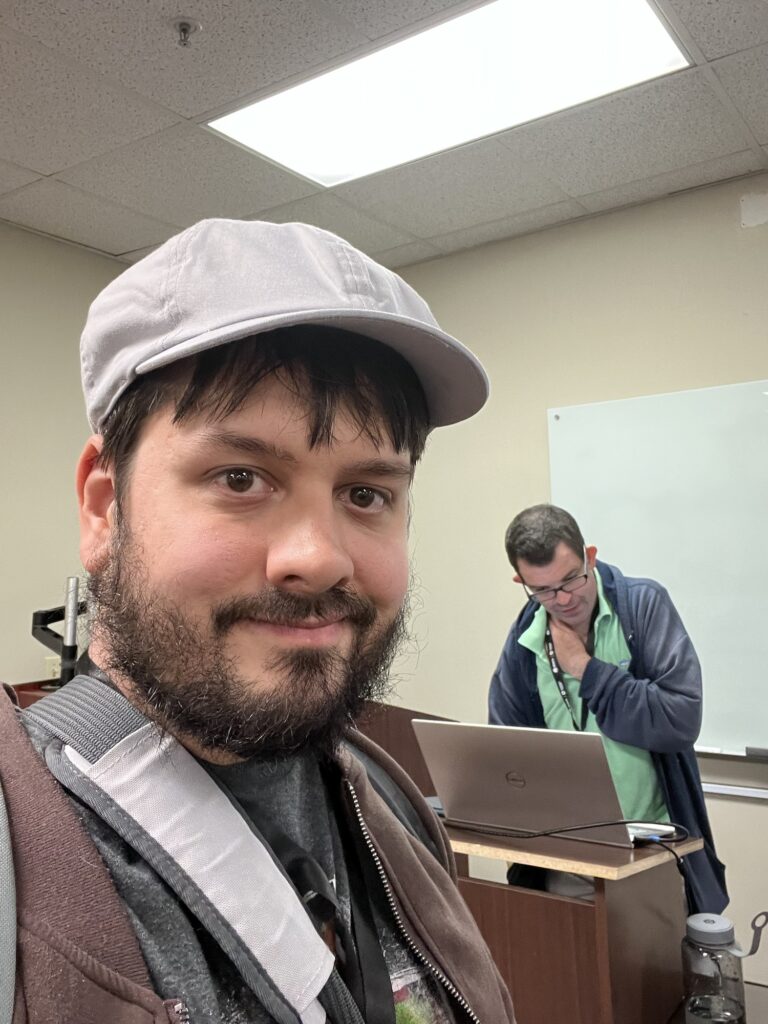
But of course, not all of us are. As I and Nick are proof of. In fact, I noted in the Q&A that I’ve never met a high functioning autistic who wasn’t an intellectual of some kind. Myself, Nick, Hugh Ross, and even fictional examples like Sheldon Cooper of The Big Bang Theory and L from Death Note seem to possess high intelligence. I hate to talk like this as it sounds like self aggrandizement, but it is what it is. Given this, I find it odd that “autistic” is increasingly being used as an insult. If anything, it should be used as a compliment! “Oh, you think I’m autistic? That must mean you think I’m smart.”
After Nick’s talk, he and I both went to hear Tim McGrew’s talk “A High Resolution Jesus”. In this talk, Dr. McGrew soundly refuted scholars like Craig Evans who say that John just kind of plays fast and loose with the words Jesus uttered, and puts words into Jesus’ mouth that, in history, he never actually said, but would have vaguely resemble things the historical Jesus taught about himself. The Synoptic gospels more or less record what Jesus actually said [3]Although if you read Licona’s work on gospel differences, even there, it’s kind of iffy, but John just sort of goes wild with literary devices and poetic liberty. So goes the claim of scholars like Evans. In the Q&A, I asked Dr. McGrew “How do people like Evans respond to this? It seems so obvious.” and McGrew’s response was basically that New Testament scholars snub him and his wife, to which I said “That’s a shame, because I think there’s a real academic debate to be had here.”
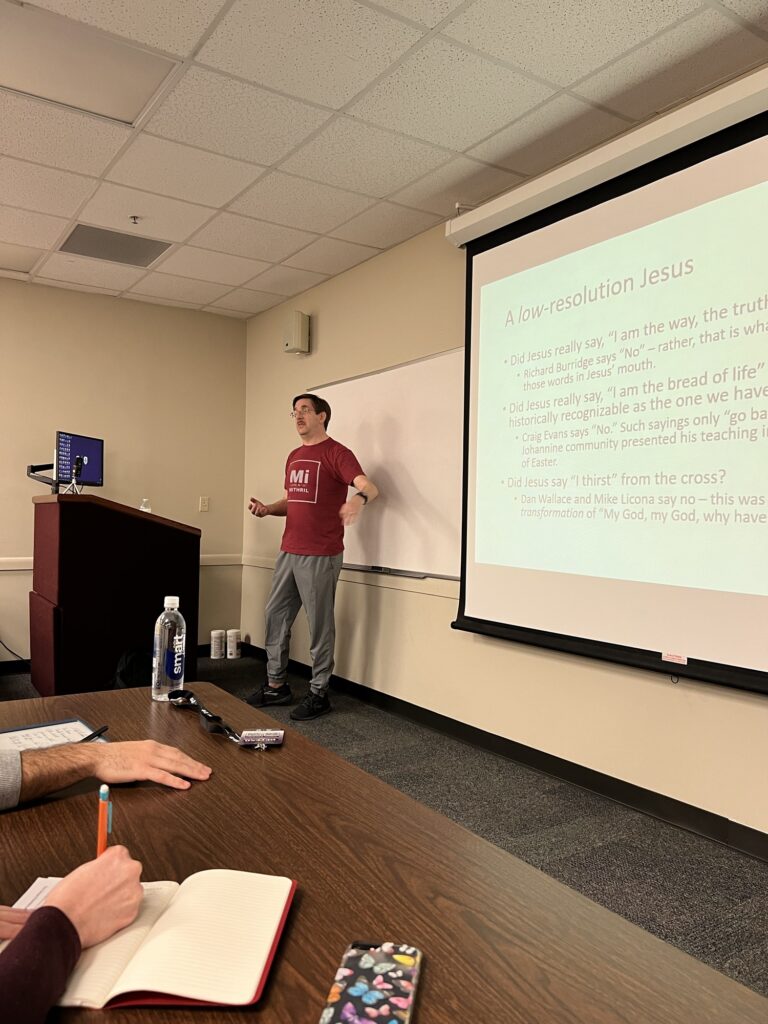
The next breakout session I attended was Tim McGrew’s “Coffee Shop Apologetics – Part 1”. And it was in the same room as the previous talk, so I didn’t have to go anywhere. I just stayed put. This was basically one large Q&A rather than a talk. It was a good conversation, and I highly recommend you buy the MP3 of the talk once New Orleans Baptist Theological Seminary has it available to download.
After that, it was dinner time.
DAY 3
On day 3, I decided to attended Jana Harmon’s talk “Anything But Christianity – How Skeptics Become Seekers”. This was largely a compilation of testimonies from former atheists from her podcast The Side B Stories Podcast. Harmon’s talk (both this plenary and a later breakout session she did) dealt with more of the psychology of skepticism and the psychological aspects that drive people to and away from skepticism, and some of the things that explain why some are either completely close minded, completely open minded, or don’t even care to think about the question at all. It’s good to remember that humans are not computers. “Sometimes reason isn’t the reason” as Frank Turek says. This is the first time I’ve heard Dr. Harmon speak. I found her to be very gentle and soft spoken. She has a a passionate heart for the lost (as all apologists should). In her talk she said that she was driven to do this research because she wanted to know why it is that a lot of skeptics cannot be moved despite the fact that the wealth of the evidence and good arguments seem to be on the Christian’s side. When these talks are available, I hope that you will purchase Harmon’s talk and listen to it.
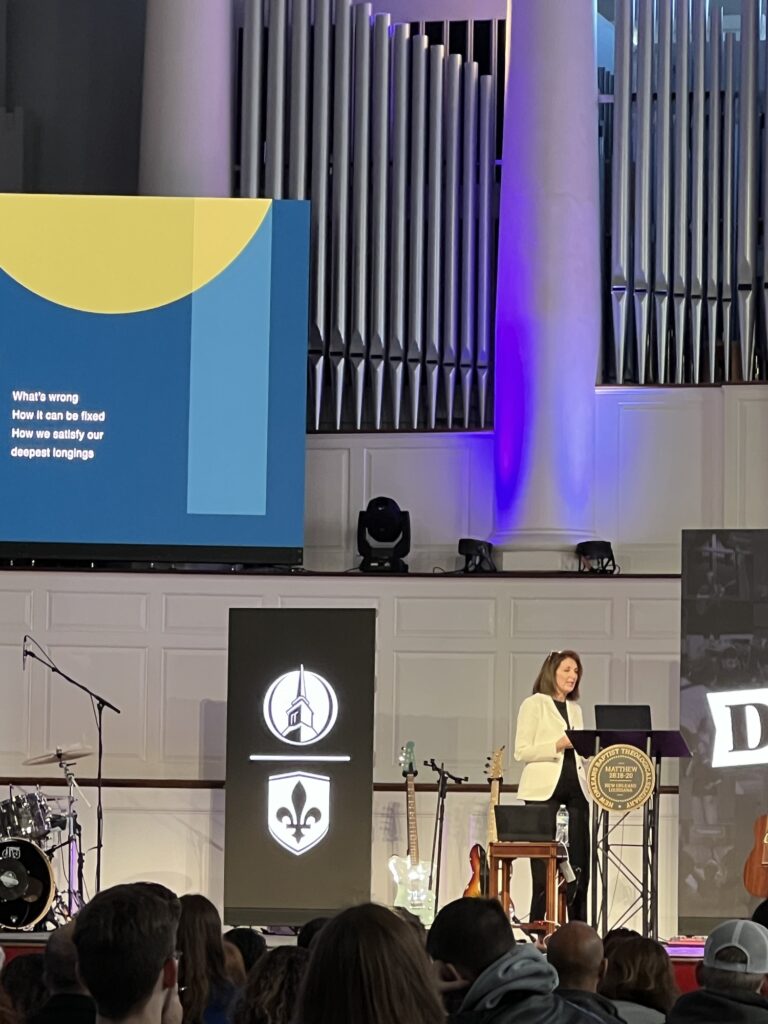
After that, I went to the caffeteria and had some coffee. Then I went back to the chapel for the next plenary session, this talk was by Tim McGrew and was titled “The Gospels and Acts As Historical Reportage”.
After that, I had my picture taken with Dr. Michael Strauss and I had him sign my copy of his book “The Creator Revealed: A Physicist Examines The Big Bang and The Bible” which I had purchased earlier.
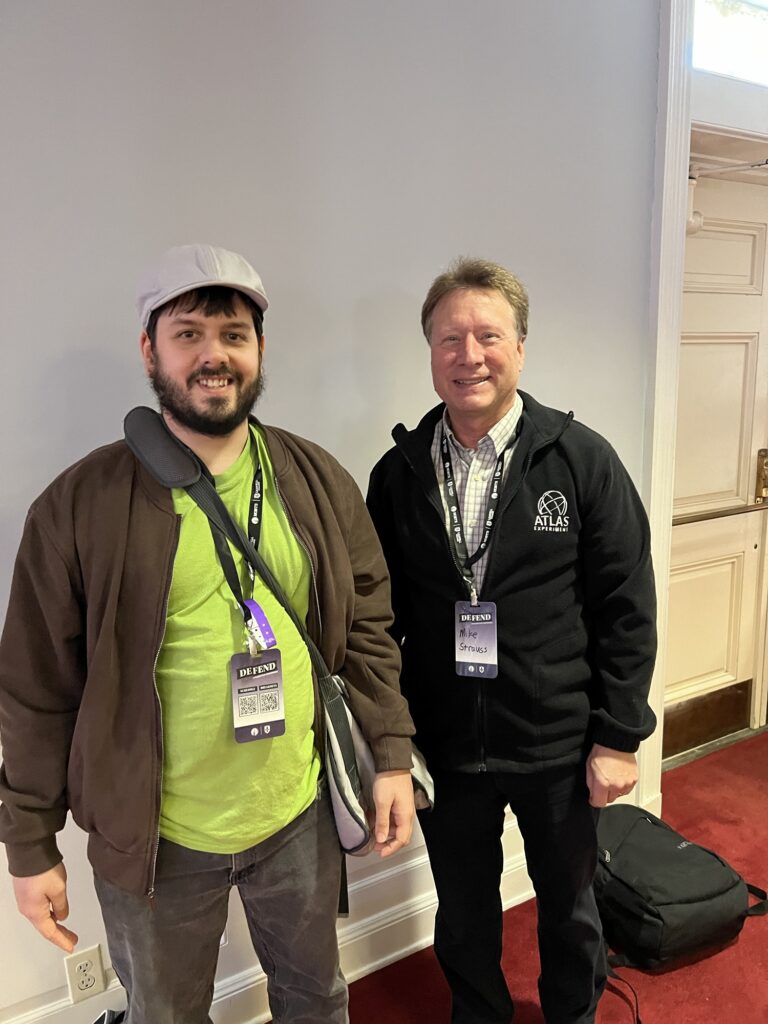
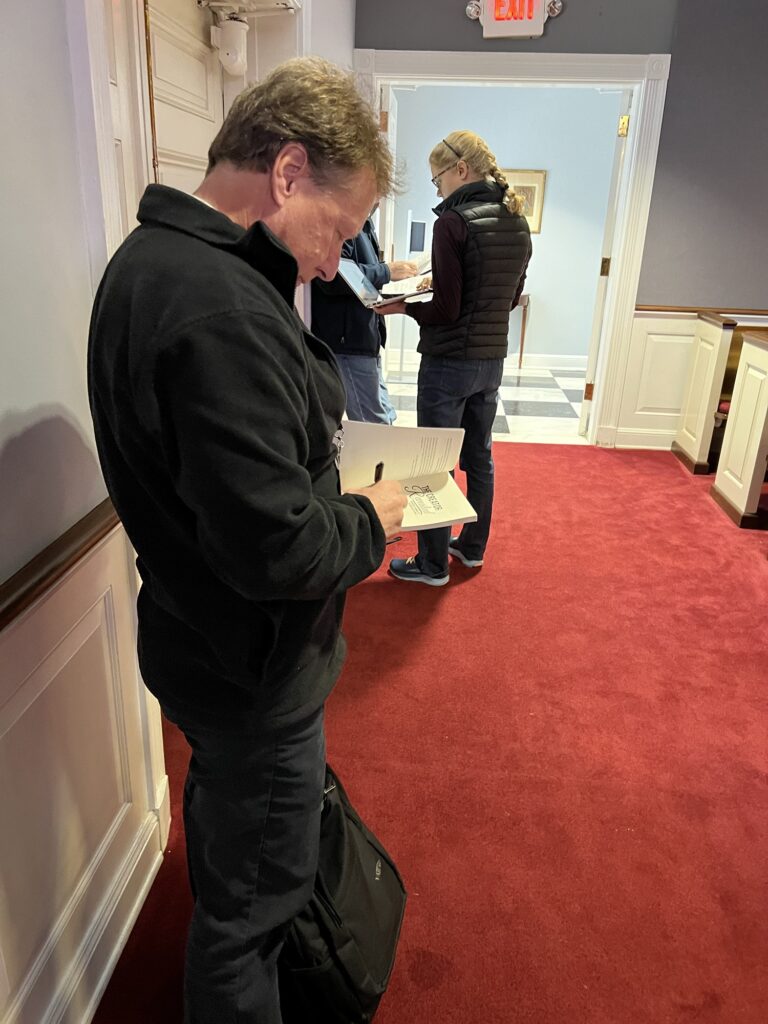
It was then lunch time. I ate lunch at a table with Michael Strauss. He was talking to a young, nerdy looking teenage girl about big bang cosmology, fine-tuning, multiverse theories, and so on. And she had her laptop in her lap taking copious notes. I didn’t participate much in the conversation. I just sat and listened while I ate my meal.
After lunch, I attended Rhyne R. Putman’s talk “Was Jesus Really Born Of A Virgin? Answering Key Objections”. Rhyne Putman affirms the virgin birth which I do affirm, and as Nick Peters affirms. This was a good talk. He’s got an entire book on this coming out in August titled “Conceived By The Holy Spirit: The Virgin Birth In Scripture And Theology”. Some of the content of his talk is also going to be in that book.
After that, I attended Shane Pruit’s breakout talk “Biblical Answers To Cultural Cliches”
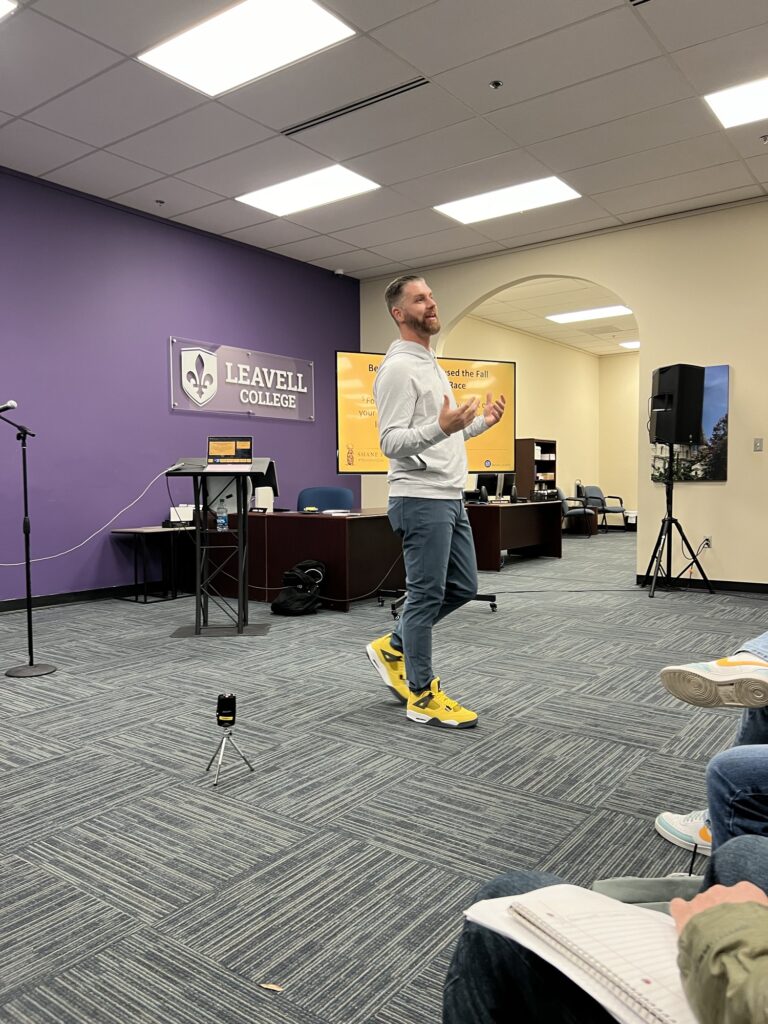
After that, I attended Jana Harmon’s breakout talk “Engaging With Skeptics – Former Atheists’ Advice To Christians”.
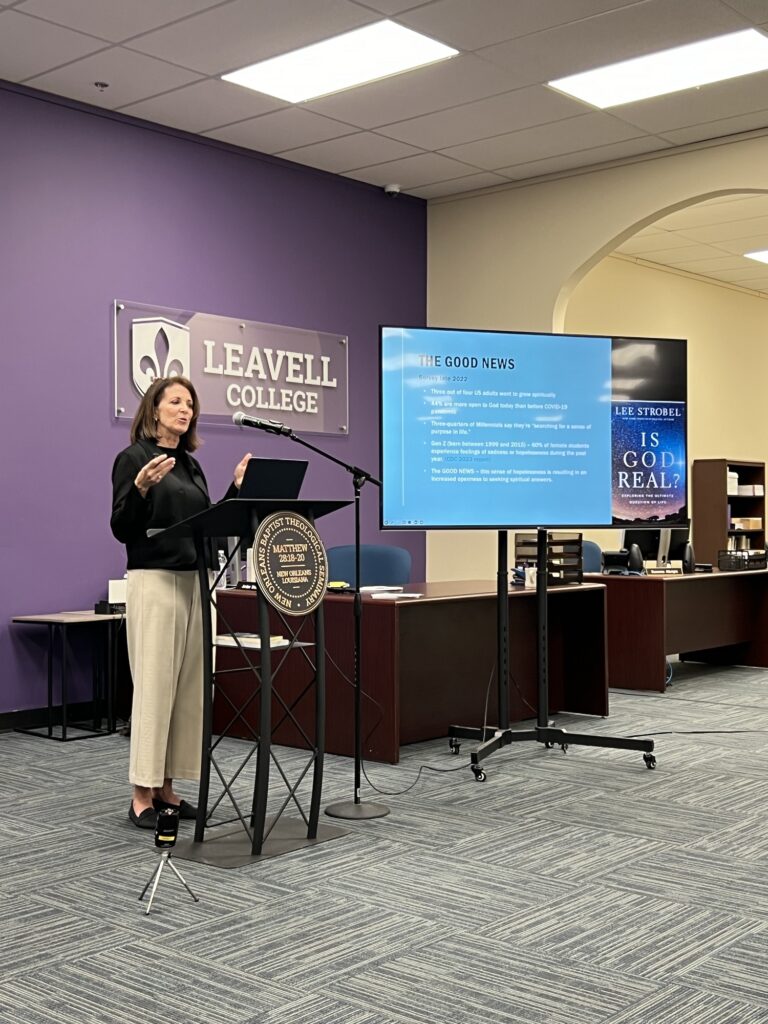
And then it was dinner time. This time, we did not go to the caffeteria. We went in groups to different restaurants. I was with Dr. Tim McGrew’s group. We went to a seafood restaurant called “Landry’s Seafood House”. It’s in front of a massive lake! How massive? So massive that I initially mistook it for the ocean!

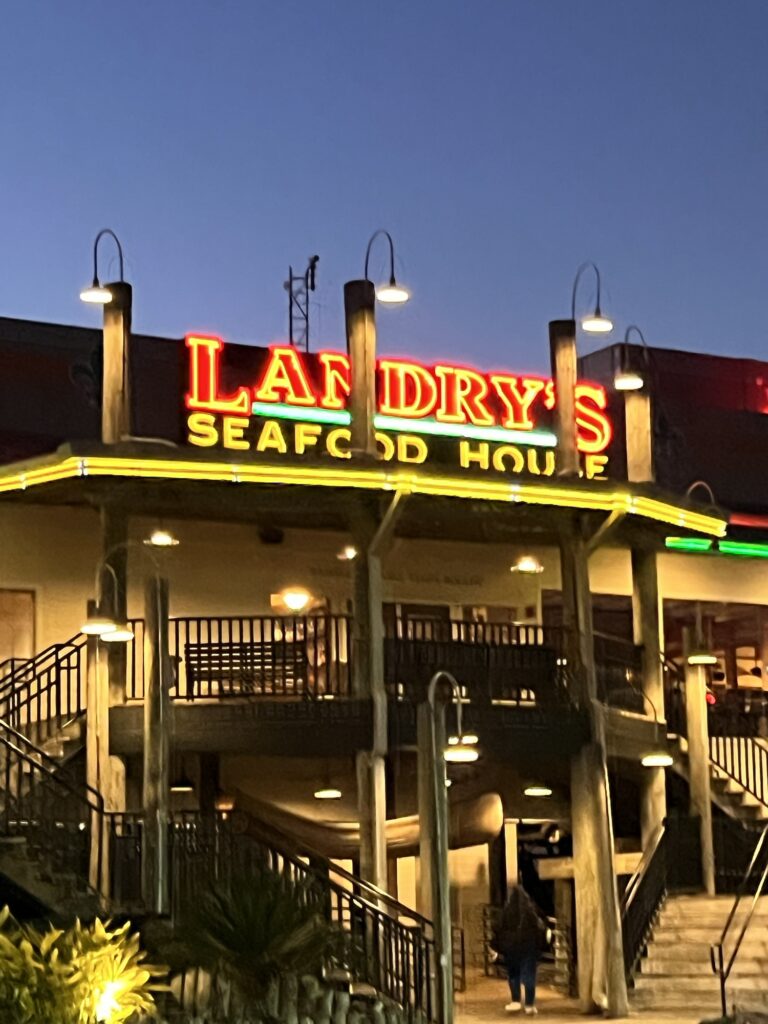
At the restaurant, I ordered fried shrimp with a side of French fries and onion rings. I had a conversation with a man named Carlos. He was one of the people who attended my breakout session on The Maximal Data Argument. We discussed things like Cerebral Faith and what kind of content I produce, how I became a Christian, and how shonen anime can be used to launch conversations about the gospel.
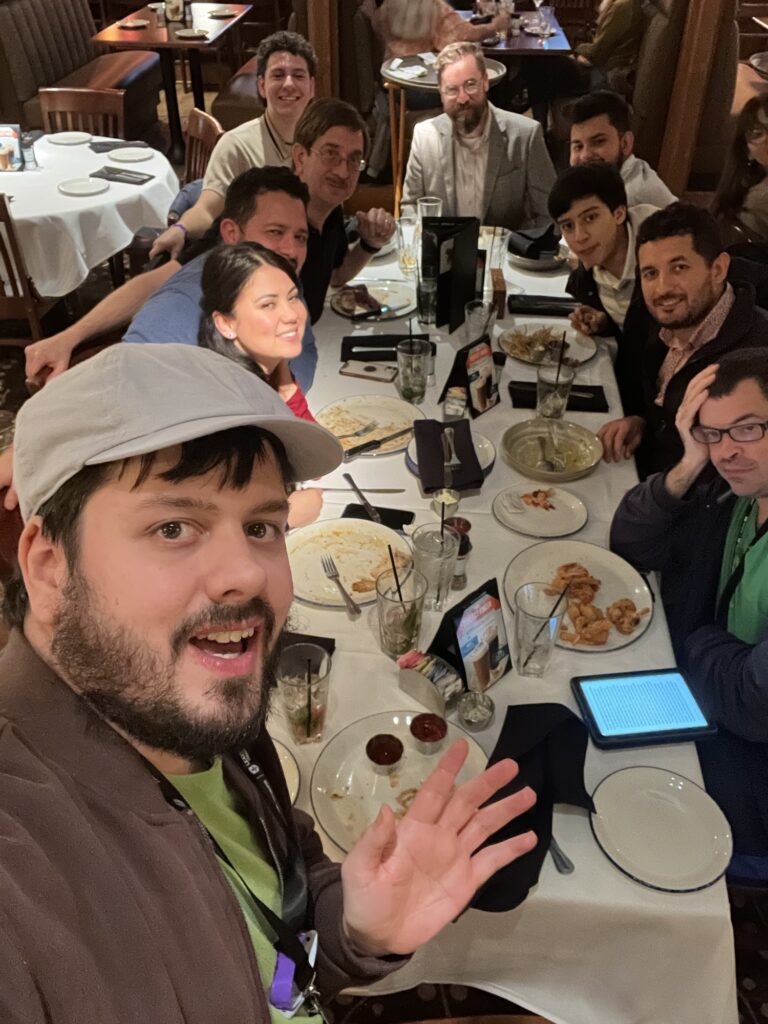
After a quick trip to Dollar General so Nick could buy a water bottle and I could buy a new phone charger, we went back to Nick’s apartment.
I bought a lot of books at this conference, probably more than I ever have at any previous conference I’ve attended. Below is a picture of the books I got.
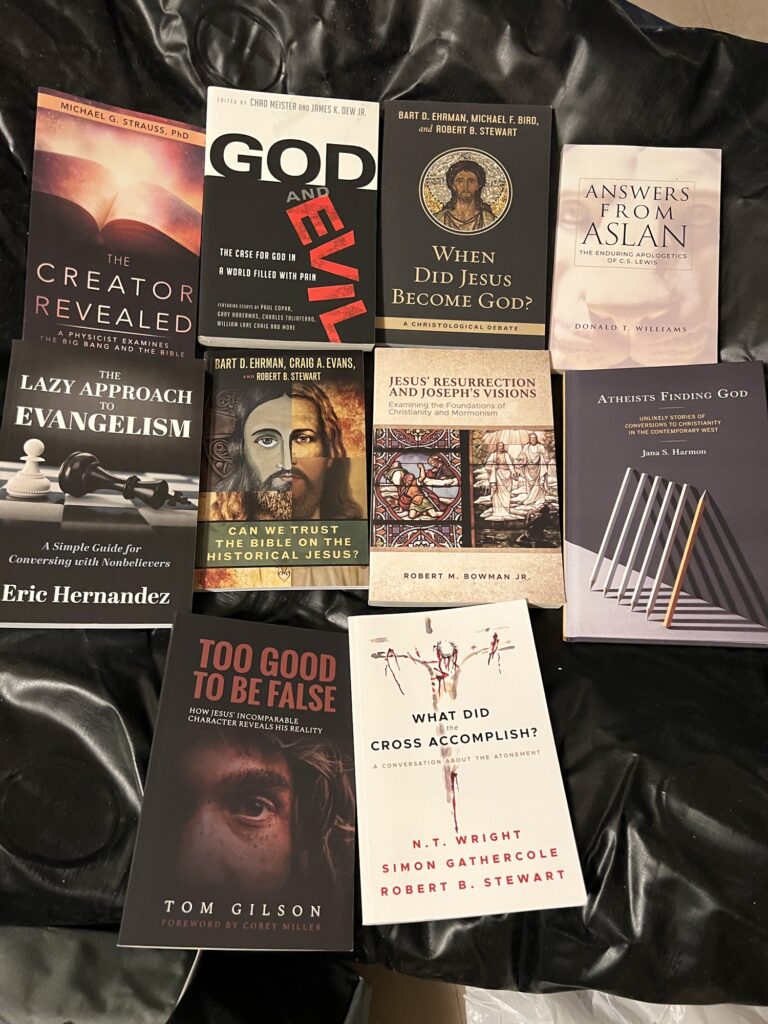
I’m going to narrate a-chronologically because, the previous night, the Seminary hosted Trivia night in the Landrum Dining Hall with a book signing from that day’s speakers. While one had to pay for the books, there were a lot of free DVDs! Needless to say, I took advantage of that opportunity. I was especially happy to get William Lane Craig’s debater with Sean Carrol on DVD (see below) called “God and Cosmology: The Existence Of God In Light Of Contemporary Cosmology”. Several people think that Dr. Craig lost this debate, but I don’t. I do think it was close, but it is my view that Dr. Craig still came out on top. I’ll enjoy watching it again.
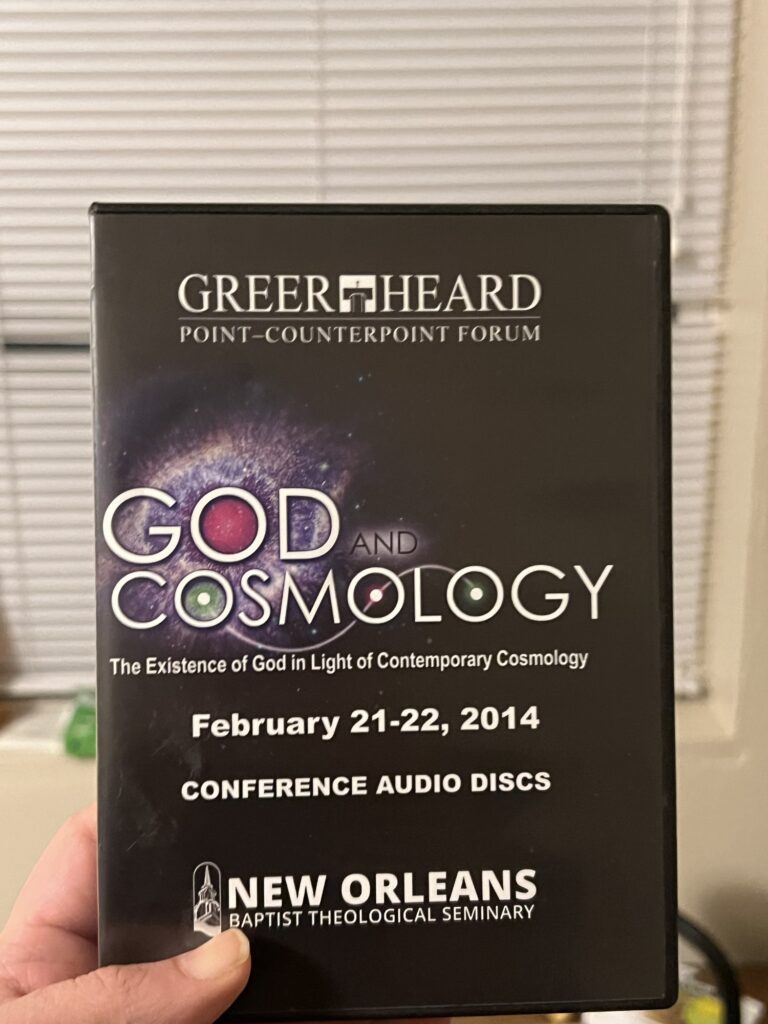
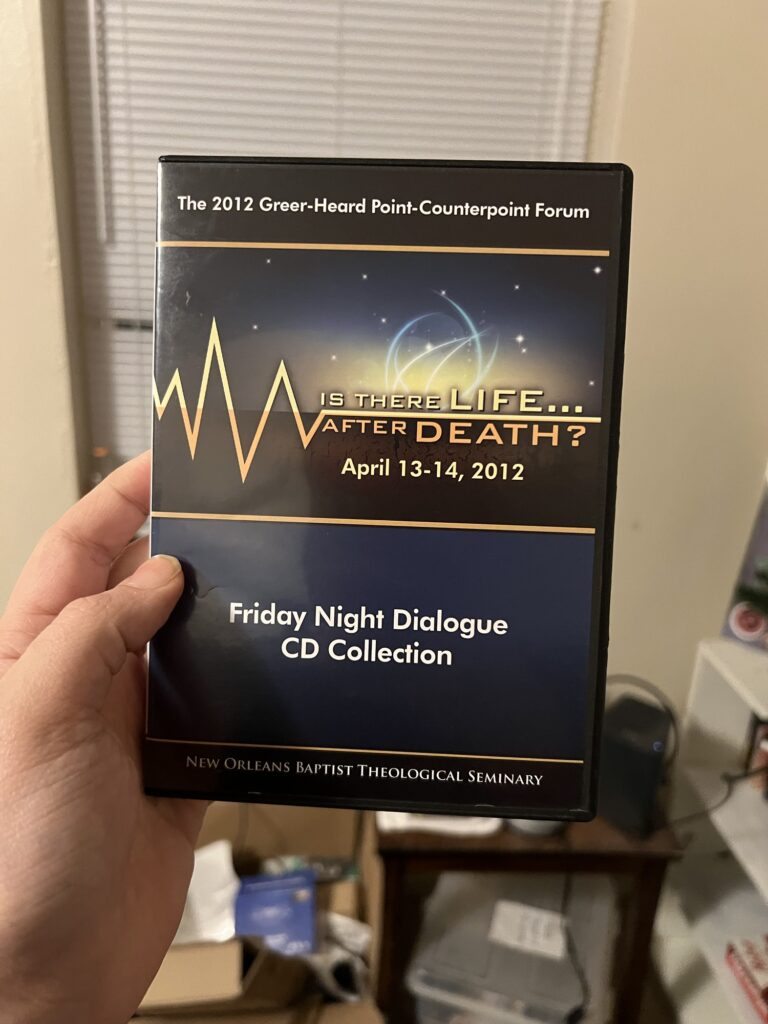
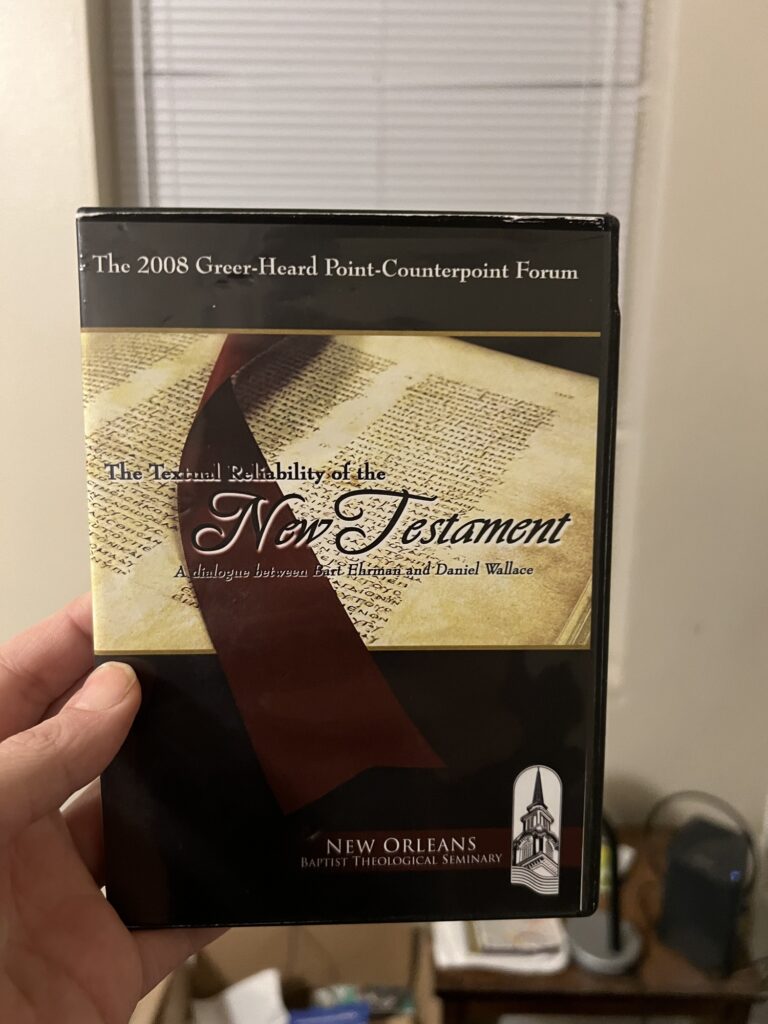
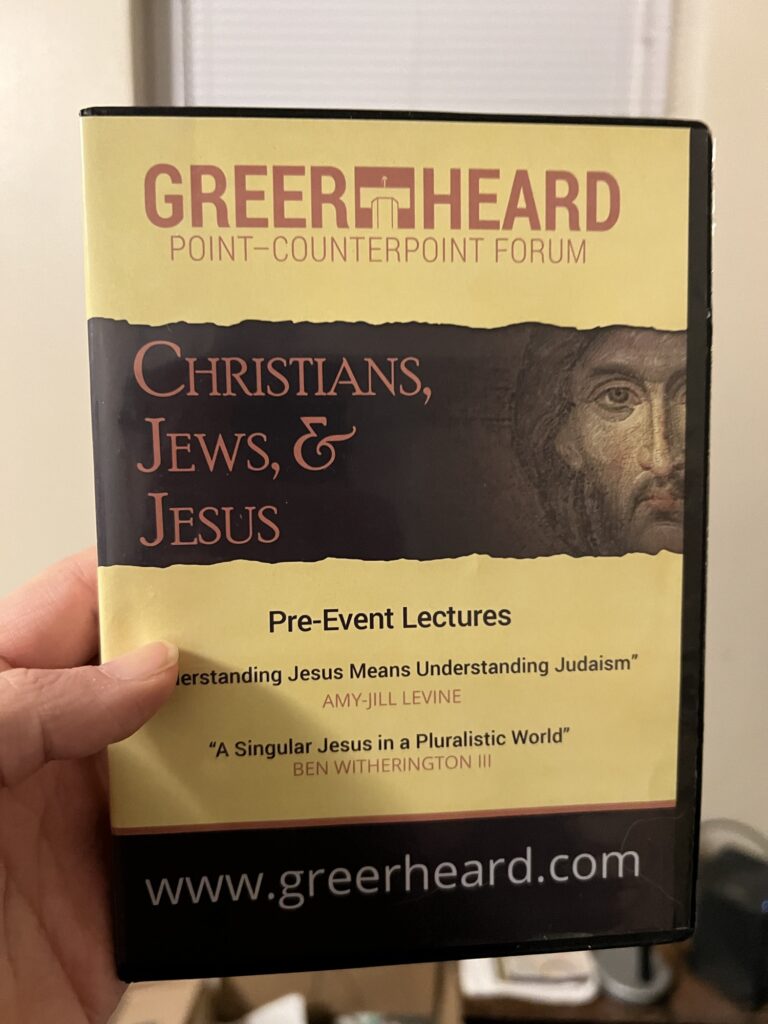
Every night near the end of the conference, there were book signings and a worship service, followed by one final plenary session.
DAY 4
I missed the first plenary talk on this day because I had stayed behind to read Will Hess and Chris Stockmann’s blog post “A Declaration Of War On Young Apologists” which I had skimmed the night prior. I thought it was basically a big response to David Pallmann who seems to have made it his new favorite hobby to crap on pop apologists like Frank Turek and J. Warner Wallace.
Here are the talks I attended on this day, the final day of the conference; “The Evidence For The Resurrection Of Jesus” by Craig Hazen.
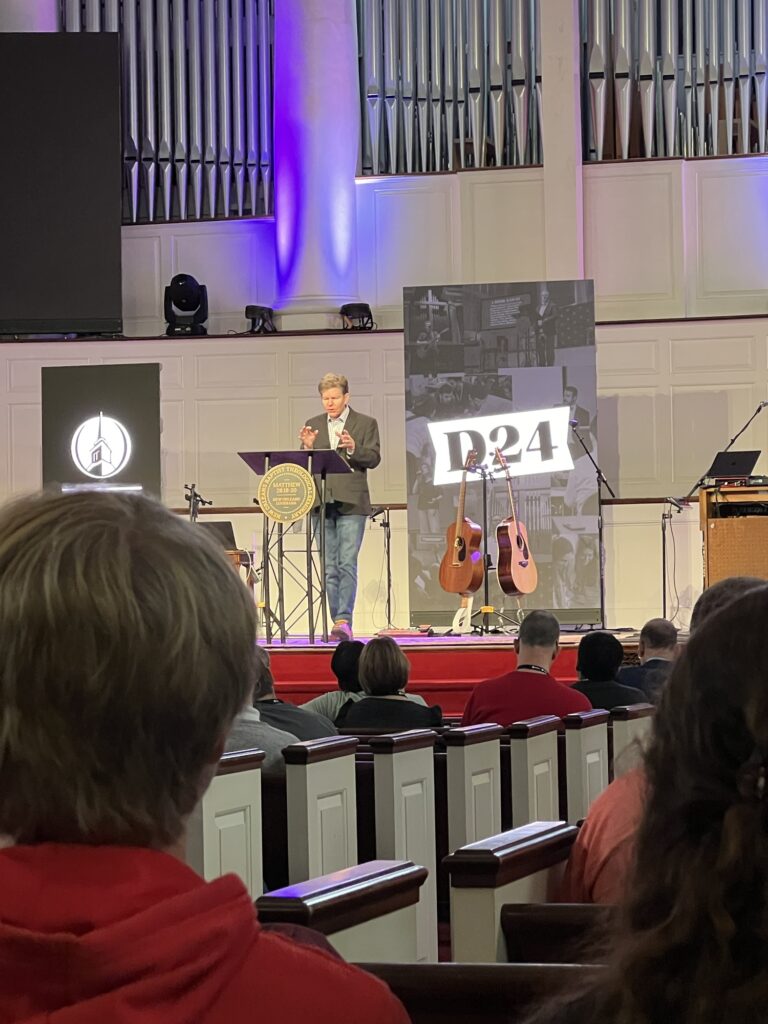
The next talk was “What It Means To Be Human In The Age Of AI” by Sharon Dirckx.
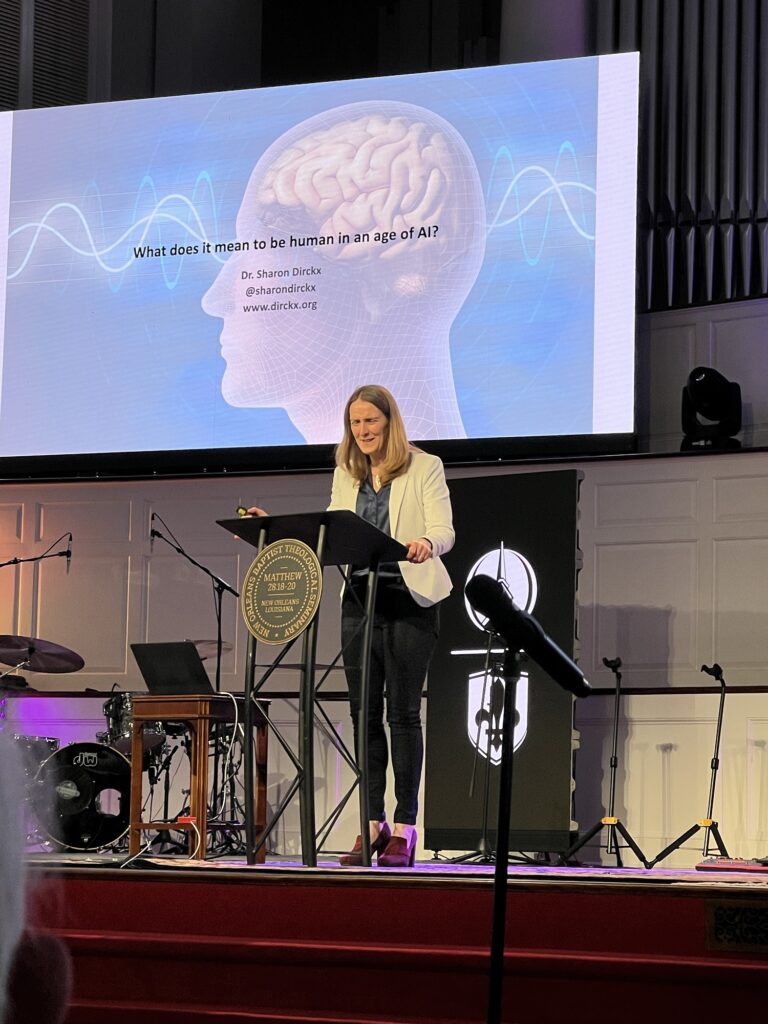
I then attended Eric Hernandez’ talk “Identifying The Dominant Strongholds Of Our Culture”.
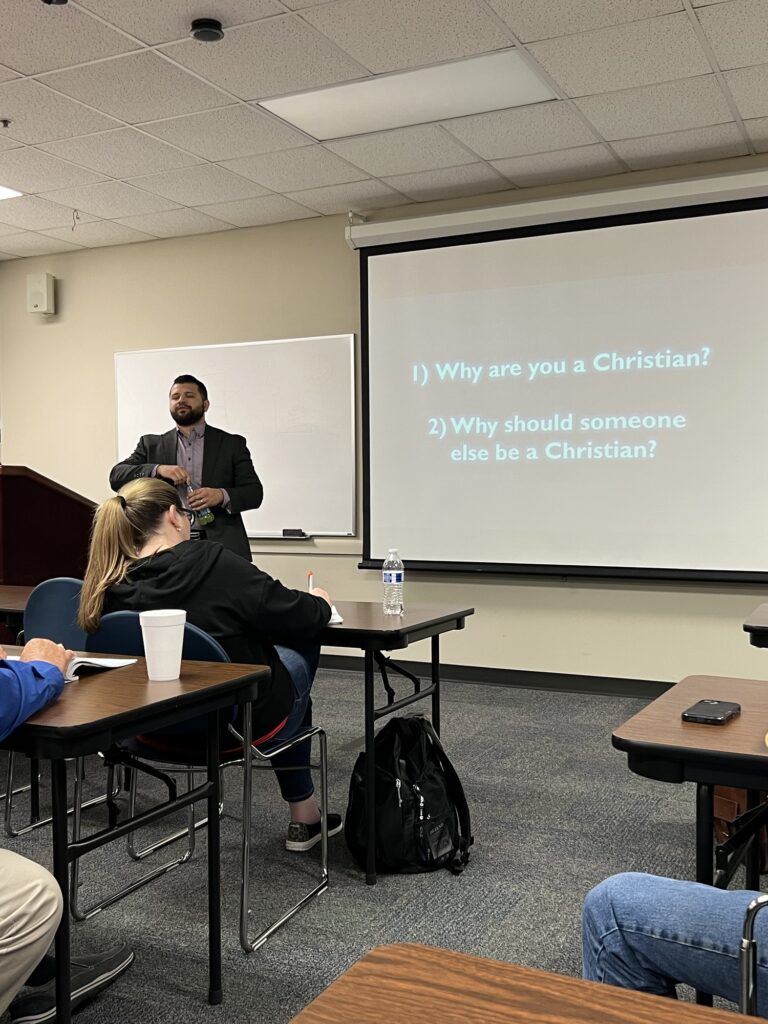
And then I attended Tim McGrew’s talk “The Lost Legacy”. This talk was basically about why we need to read more dead apologists like William Paley and others who lived prior to the 20th century. He made a good case. I had already decided that one of my New Year’s resolutions would be to read more dead guys, but after hearing McGrew’s talk, I want to even more now. All of the books he mentioned are in the public domain and he is going to send them to anyone who e-mails him in PDF form. Free books! Yay!
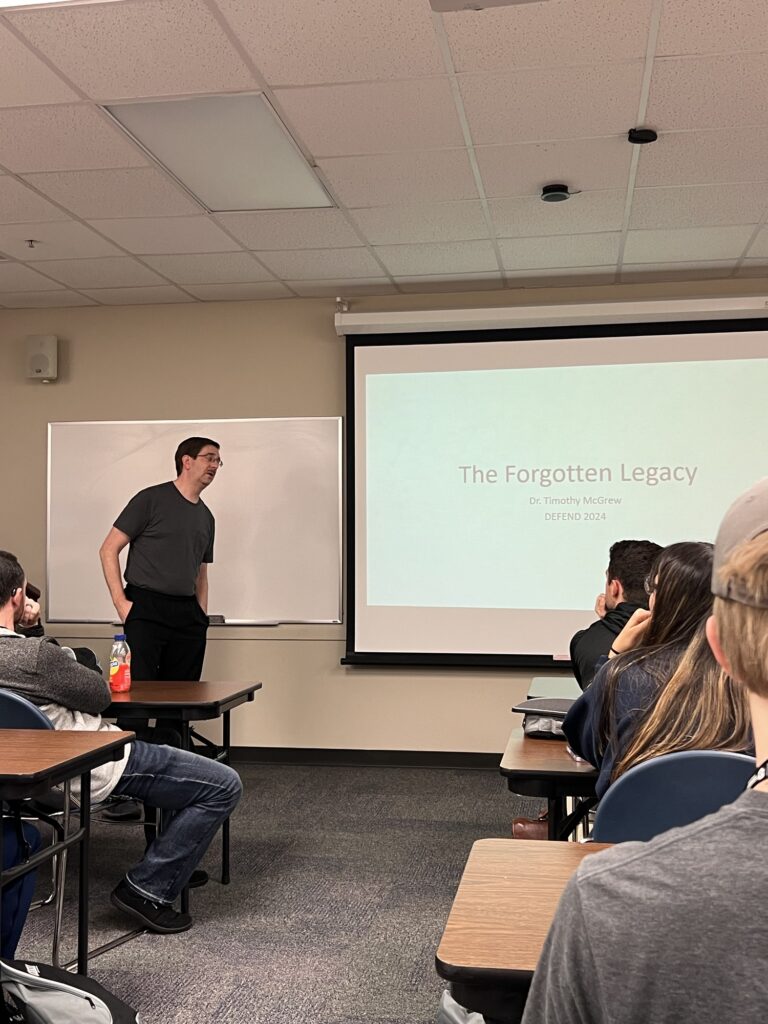
After that, I stayed in the room and attended Tim McGrew’s talk “Coffee Shop Apologetics – Part 2”.
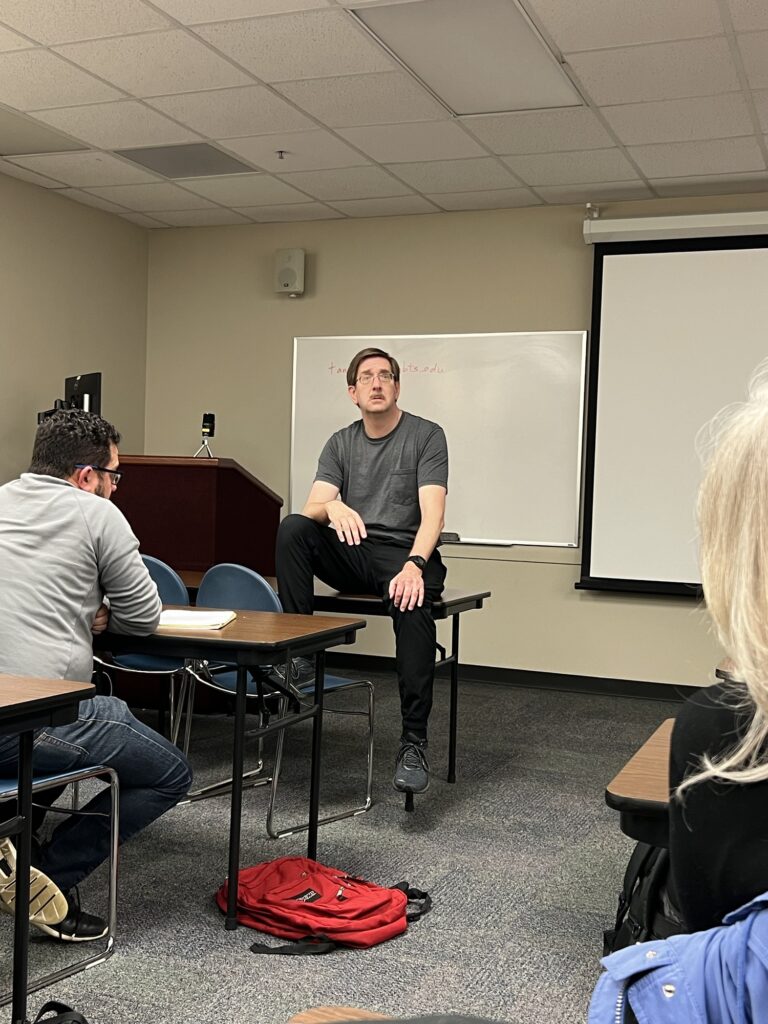
Then I had dinner, attended the final worship service, and attended Tawa Anderson’s talk.
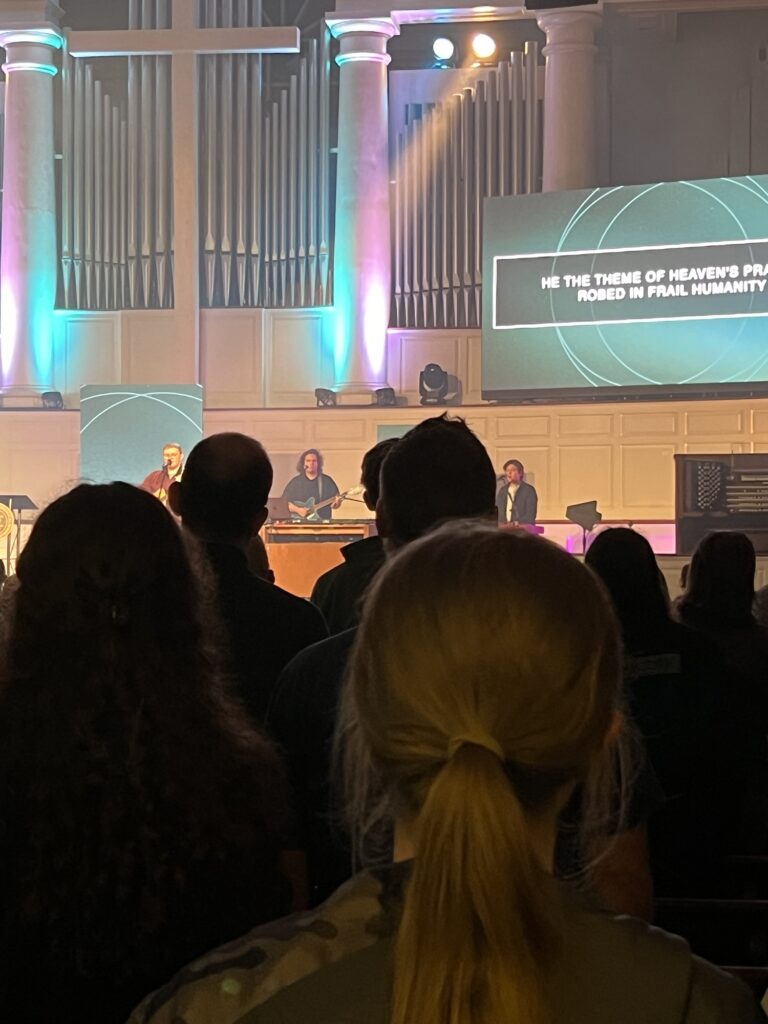
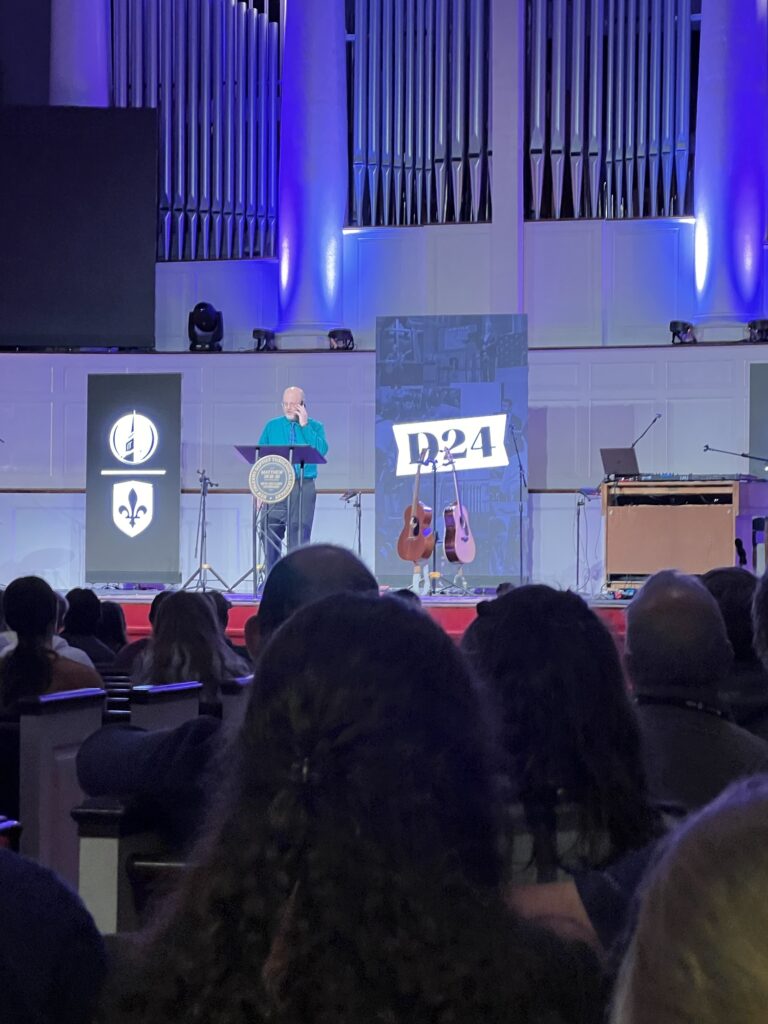
By the way, on the final day of the conference, I wore the same outfit that I wore on the first day of the conference. You can see that in the picture below. Now, this should not be taken as literal historical reportage. This is clearly a literary device. I am making reference to the scriptures that say that God is the first and the last. (e.g Isaiah 44:6, Revelation 1:17-18, Revelation 22:13).
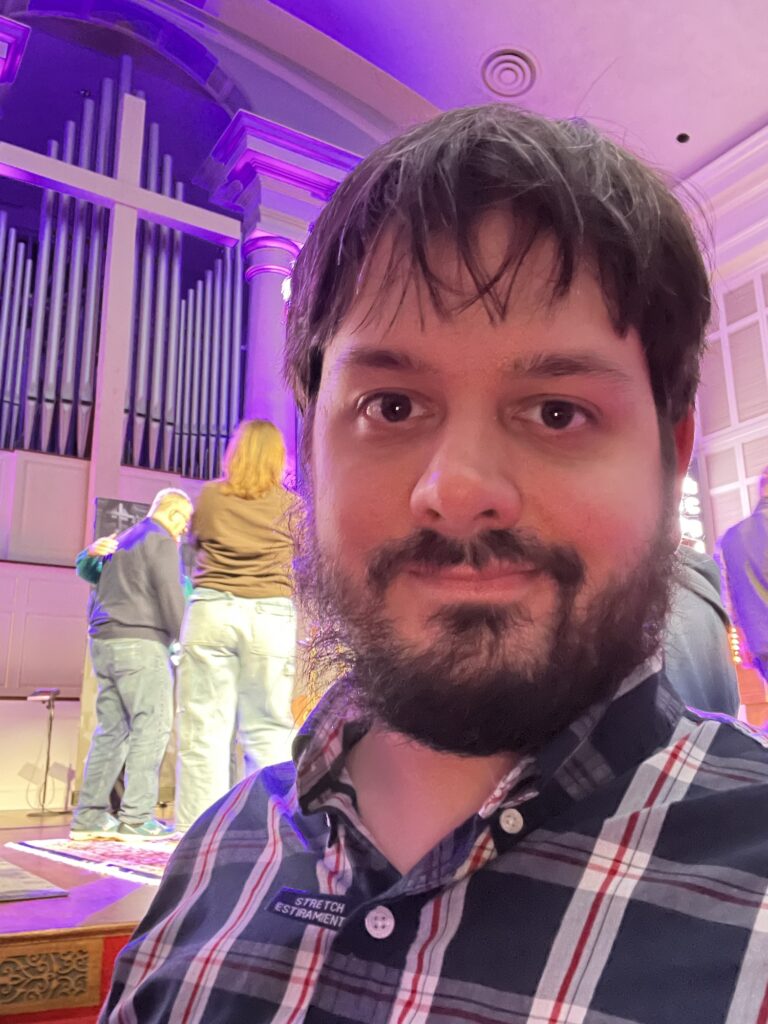
Anyway, the next day, Nick and I went to the park to participate in Pokémon Go community day (Rowlett), and I caught a Rowlett with great stats as well as a shiny with ok stats. And the cool thing about Pokemon caught on Pokemon Go is that their bio page says where you caught them. So it will say “Caught In New Orleans”.
When I got to the airport, I did some souvenir shopping, and then I got on the plane and went back home.
Here’s a picture of the souvenirs I bought myself. I got souvenirs for my little sister, Kendall, and my cousin Crystal. They are alligator plushies with New Orleans T-shirts. I got one of those for myself in addition to a coffee cup because I am a coffee drinker and I like to collect coffee mugs.

Conclusion
I had a really great time at the Defend Conference. I learned some things, I got to fellowship with my fellow Christian Apologists and theology nerds, and got to see the school where I hope to be attending to pursue my academic career. What a great way to start off the New Year!
References
| ↑1 | Here, I’m taking jabs at New Testament scholars like Michael Licona and Craig Evans who make up wild literary theories out of their imaginations to account for, say, differences between the synoptic gospels’ same account of events (as in Licona’s book “Why Are There Differences In The Gospels”, or why Jesus supposedly sounds so different in John than in the Synoptics (as Craig Evans argued in a debate with Lydia McGrew). I respect both of these scholars, but they fumble at this point. For a good critique of this position, I recommend Dr. Lydia McGrew’s books “The Mirror Or The Mask: Liberating The Gospels From Literary Devices” and “The Eye Of The Beholder: The Gospel Of John As Historical Reportage.” Both by DeWard publishing. |
|---|---|
| ↑2 | This is known as “The Two Books View” which is talked about in The Westminster Confession. The view holds that God is the ultimate author of scripture and is the Creator of the universe. Ergo, when both are properly interpreted, there will be no conflict. |
| ↑3 | Although if you read Licona’s work on gospel differences, even there, it’s kind of iffy |
Discover more from Cerebral Faith
Subscribe to get the latest posts sent to your email.


